#its neurotic behaviour all the way down
Explore tagged Tumblr posts
Text
if there's one thing about being an adult and living in and going to other people's houses that ive discovered it's that i'm actually really clean and organized as a person my mom is just mentally unwell (←says with immense affection) and expects everything to be perfectly pristine and in its place constantly forever or she gets anxiety attacks and can't rest until everything is clean to her satisfaction. and i got some of that from her but she is convinced her standard is normal, and i get why because my grandma was the same way and she was the perfect "house wife" in terms of her domestic capabilities with everything always in its place in a way that appeared effortless and she'd get massive anxiety if it wasn't. and it's because they both have/had this thing where cleaning and organizing soothes them, they self soothe by doing house chores, when they are frustrated or upset about something they reorganize the kitchen or bathroom or deep clean the whole house. and i got that too of course i was raised with both of them as my primary caregivers but i got it most strongly when it comes to my body and feeling clean like at my worst i would shower 5 times a day because i never felt clean enough and it would calm me. but i'm also trans and since i medically transitioned that compulsion has eased to a more manageable level lol i wonder why. but it's one of those things where these compulsions are so normalized that my mom doesn't fully comprehend that most other people are not as clean and organized as she is so in her mind i'm the messiest person on the planet and doesn't understand why most people come away from knowing me thinking that i'm a really clean person shrjwidjarbhwdiajfnsjdk
73 notes
·
View notes
Text
Who takes decision in your life?
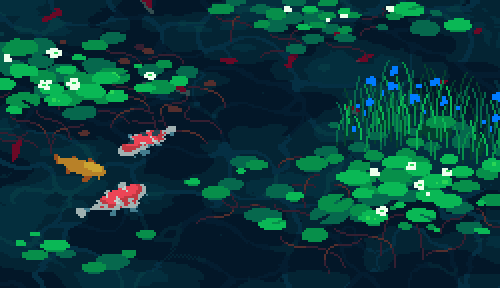
🌸 for anyone who resonates
I was met with one question "Who is in control of your life?" People replied "Me"; i thought to myself what was my answer? I never felt like i chose my choices. Sometimes they were wishful thinking that happened to come true. But most of the daydreams did not come true. Hint: No I didnt fall in passionate thrilling romance with a bad boy who only has soft place for me. Not to say that fantasies are useless. Fantasies are psychic processes that tell you a lot about yourself. They are not waste of time either. Fantasies tell you have a creative bone that is urging to express outside. Most of the times fantasies are when we are really bored stressed unsatisfied lonely insecure in life. Fantasies can be a way to quickly satiate unfulfilled desires.
But somewhere fantasies create unrealistic expectations that are almost impossible for the life we currently actually have. And that is a pretty shitty way to live. To be always living in glamour of fantasies, anticipating it and hightened expectations. Not to forget that for every 1 successful person there are 100s of those who do not succeed. "Just try harder", "Good luck next time", "You probably didnt work the right strategy" but the real answer is "I dont know why you did not succeed". I personally dont believe in law of attraction because it did not work for me. So I instead chose to go with the flow of the tao and let fate bring whatever result it wants.
Jeff Bezos once said "When a company comes up with an idea, it's a messy process--There's no 'aha' moment." What it means is that rather than panicking for the final result, try to solve the mess that the process is. As an 8th houser, my life + my parents' life (both 8th housers) have been very unpredictable; just when we thought things were stable something would create ripples and disturb the calm waters. From one extreme to the other, we were all affected by each other's fate and ups downs. Being a child, I would get neurotic thinking "why is my life not carefree like others", "why cant i be stable for one day", "does everyone have such rollercoaster life"? Then I would think "perhaps if we get through this life would calm down", "perhaps this is the last challenge", "just this time then i will enjoy life". Little did I know that 8th house is highly karmic and fated. Same for Saturn/Saturn in 8th house/Pluto placements. When life feels fated, you have no choice but to surrender to the forces. Because the more you consciously push the more life resists your movement. Problems of 8th house are not going to mild, we just learned to be calm in emergency, control our panic, calmly take logical decision and manage our life as much as possible. The lesson for these people was "to choose their emotional reaction".
"However simple an impulse appears to be, every nuance of its particular character, its strength and direction, its course, its timing, its aim, all depend on special psychic conditions, in other words on an attitude. And the attitude consists of a constellation of contents so numerous that they cannot be counted" - Carl Jung. My current life attitude is somewhere between cynicism, hopeful pessimism, taoism and stoicism. A mix of all these work for me. What it means is that instead of obsessing over things not under my conscious control (like result of an exam, behaviour of other people, fate of a relationship), I only focus on things under my control that is effort, reason and mind.
It is not passivity or defeatism. It is a life lesson for people who have faced many misfortunes to be prepared for the future and to make peace with the past.
#astro community#astro observations#astro placements#astro notes#astro tumblr#astroblr#astrology#astrology blog#astrology community#astrology notes#astrology observations#astronotes#dark astrology
46 notes
·
View notes
Text
Ethan Freeman Phantom interview
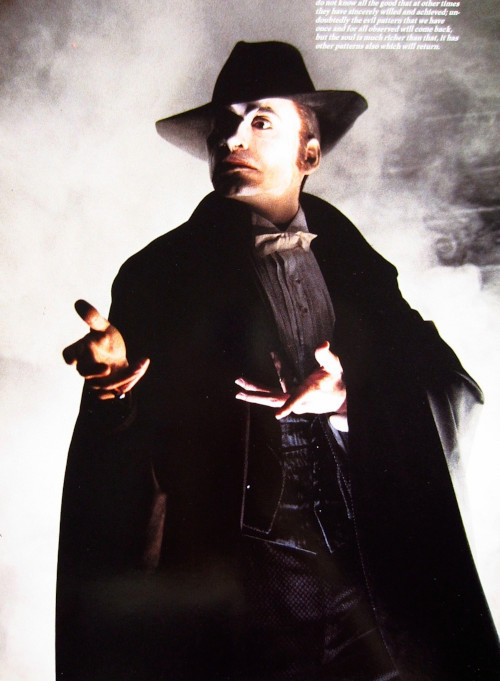
An interview with Ethan Freeman from about 1994 or 1995, printed in “Beneath the Mask” #8 (which I haven’t found my print copy of yet, but the interview was reproduced on our old POTO fan site).
Also of note about Ethan: at the time he was one of the two youngest actors to have played the Phantom - he and Anthony Warlow were both 28 or 29 when first cast in the role.
Are there any differences between London and Vienna - if so, what are they? The general tone of the production in Vienna was slightly more Operetta-like, probably due to the language, the sound of the translation and style of acting of some of the players. The tempo was also at some points quite different depending on who was conducting, and would undoubtedly feel strange to me now. The audience tended to be less tuned in to the humorous moments in the show in general, and some scenes like "Managers I & II" for example, simply run better and are more clever in English.
How did you get the role? I got the role of the Phantom after auditioning for Hal Prince and Gillian Lynne and the Viennese producer and musical staff. They appeared very excited about the audition. I'd sung "Music of the Night" which they praised in a friendly manner (Hal is always positive and encouraging), and they sent me off to learn the segment from the Final Lair "Order your fine horses... This is the choice. This is the point of no return!" When I came back the next day to do it (the Phantom candidates appeared by then to have been reduced to three) Hal said "OK Ethan I want you to scare me!" So I did the section with as much power and venom as I could muster (Id never seen the show - I think Id heard the record once or twice...) and after it was done, Hal just said "Great. You scared me!" and that was that really. Later that day they explained to Alexander Goebel and me what they would like and would we be willing to share, obviously with Alex, who was very well known, being the dominant of the two. So we split 5/2 which frequently ended up being 4/3 as the run went along.
How did you research the character? I read the novel finally, all the way through. Ruth Hale, my partner in "Cats" at the time, later to premiere as Mme Giry in the Hamburg production, gave me a copy as a present. I'd seen several of the films over the years so I knew there wasn't much to be mined from those - although Lon Chaney Snr did display some magnificent body language, and I've nicked at least one dramatic gesture from him. Principally though, I had several long meetings with Hal in New York to talk about the role and show. He instructed me to go watch Michael a few times then come back and talk some more. Crawford was magnificent, at the peak of his vocal power and still fairly fresh in the role and I was moved and impressed as I have not been since by a Phantom. (Though Dave Willetts, I must say, also made a huge impression the first time I saw him, for his power and well-delineated psychotic behaviour.) At first I thought boy, you've got your work cut out for you on all fronts. So, I would say my "research" of the role was principally based on my own discussions with Hal and also largely on my own thoughts and feelings. Obviously most of the physical manifestations of the role, make-up, costume, blocking, etc were predetermined so there wasn't much scope for change. To be honest, I feel some of the Phantoms I've seen tend, in an effort to be different, to stray from the basic line of the drama and weaken themselves as a result. Michael's acting was extreme, yet very clear and economical at the same time, and I also try to offer the audience a complicated and ambiguous character going through clear, unambiguous moments of his life - otherwise it's so easy for the audience not to "get" everything that's there - or to "get" things that aren't intended to be there at all.
How do you feel on stage? So varied in thought and feeling that I can't really give a concise answer. I feel quite differently now to how I felt 600 odd shows ago. I used to have to concentrate on staying concentrated - now it just happens. I know what to achieve and just try to let it happen. I'd say I'm both in and out of Erik at the same time and he in me.
Do you think it's based on a true story ie. did the Phantom exist? I doubt it - I haven't read this newer novel "Phantom" yet and don't intend to until I finish playing the part. However I've been to the Palais Garnier and in all senses of the word it is a 'phantastic' theatre, one which easily conjures up many stirring images - beautifully represented in the Phantom designs, I'd say!
What do you think of Erik? I wish he'd let me have a little more time to myself! Oh, I don't know. He's a sad, bitter, brilliant man. He has a great brain and can be a real bastard. I find him easy to understand - he's motivated by a terrible profound loneliness and has been forced to create his own universe which has its own laws. Anyone who has known some kind of loneliness or feeling of apartness when they were children or growing up can tune in to this crucial aspect of the Man, which is his great mythical attraction. He is so powerful, awesome, in control and yet so hurt and vulnerable. He must epitomise great beauty and great ugliness at war with each other, reason and insanity, God/Satan, Id/Ego battling it out. In the end, he learns about sacrifice, shows mercy and is redeemed by love - a great, archetypal Romantic drama - another reason why the story has always been so popular. I can't stand it when I see Erik played as a "nutter". Yes, he goes "crazy" a few times, but in general he is not insane in the pathological sense. I feel if he is played as a schizophrenic or a psychopath, the romantic ideal of the story is dashed, because both of those conditions would indicate a "determination" that makes any hope of redemption impossible, and would break with the "Romantic" style. He is very melancholy, angry, egocentric, neurotic perhaps, and goes off into rages of frustrated sexuality, but he is not insane. And I'll kill anyone who thinks otherwise!
What do you think happens to him at the end? That's our little secret! I think the different fan magazines have probably spent pages on that so I don't see I need to contribute. He goes!
Why do you think the show is so appealing? Some lovely songs, great orchestrations, a nice mixture of melodrama and light comedy, some stunning sets and a lot of good theatrical magic: and on the thematic side, many of the things I've mentioned before, which I suppose you could define as the archetypal Beauty and the Beast scenario which, if honestly portrayed, can tug the heartstrings of even the most urbane Japanese businessman.
What is your favourite role of those you've played? Obviously Phantom is the supreme role in my repertoire to date. I did however, really enjoy my stints in other Lloyd Webber shows as well. Che in "Evita" was very cool to play and Gus/Growltiger, while exceedingly 'uncool' thanks to the heavy knitted costumes, was a joy to play, despite being totally knackering, and one that I was surely born to do. I really enjoyed doing Hajj, the Poet in "Kismet" with the BBC Radio 2 last year, working with the composers, and would love to have the chance to do that again on stage someday.
What role would you like to play? I'd quite hope to have a go at Sweeney Todd somewhere down the line and would still like to play the Celebrant in "Bernstein's Mass" at some point. (I've nearly done that a couple of times.) Add to that a heap of great operatic roles I'd love to do but probably never will and whatever new, unknown roles lie lurking up ahead. We'll wait and see!
End note from me - Ethan’s wrong about schizophrenia, but hey, this interview was 25 years ago and actors can’t be expected to be experts on mental illness. But I really love this interview, the depth he goes into, and how his sense of humour comes through too.
#the phantom of the opera#phantom of the opera#ethan freeman#classic phantoms#poto#poto legends#phantom legends
96 notes
·
View notes
Text
Cone Snails versus Man
Deep Sea Diving with all the diving gear, through a rigorous and vigorous training has its invaluable dividends. Among the fish, he is likely to see colorful objects. The Cone Snail.

Colorful Cone shells The snail underneath would be a boneless Snail, looking for its own food amid equally colorful fish. Remembering about electric eels in fresh water, training would have taught him to regard these with the respect due to a living organism, but yet research and seek to satisfy his curiosity.

The cone snail is known for its beautiful shell and that is what attracts the collectors. On being picked up by its shell, the snail will stick its harpoon into the person. The kind of effect will depend on the snail’s poison as each one has its distinct fingerprint. The poison contains a neurotic element which can temporarily paralyze you. Severe respiratory problems will start developing and the body will ultimately shut down due to the nervous breakdown. It is advised that if you are stung by a cone snail, immediate CPR Cardiopulmonary resuscitation should be performed or else risk dying. In extreme cases, full blood transfusions might be necessary to get the poison out of the system.

The cone snail, one of the most venomous animals on earth, releases a cloud of insulin when a fish swims by, causing it to go into hypoglycaemic shock, immobilizing it so it can inject the fish with a cocktail of up to 200 toxins.
Museums Victoria, Australia's largest Public Museum, holds about 8000 individual cone shells. A team of scientists there spent months digitizing and re-organizing those shells. In life, all the cone snails used venom to hunt prey. Inside one particular shell was a kind of Cartridge containing the arsenal of neurotoxins so diabolically complex it may actually harbor secrets which prove hugely beneficial to human society.

So the most venomous animal on Earth is probably not a predator like a Rattle Snake or a Cobra, or even a Viper, that looks dangerously intimidating. Surprisingly its the Snail, also a synonym moving at the slowest of speeds.The kind that is in the Ocean, sporting a Shell so exquisite it is among the most desired of all sea shells. Its shell is conical, placing it among the 800 or so species of marine predators which make up the Conidae family—known in plain English as cone snails.
Conus geographus—aka, the Geography Cone—eats fish. Sometimes, entire schools of them.
youtube
Yes, one of the slowest of creatures catches one of the fastest, even several at time. Not by chasing them down, but by immobilizing them.
With chemical weapons.When its unsuspecting prey swims past, the Geography Cone releases a cloud of insulin. It’s the same hormone used as a life-saving drug for diabetics, just subverted.
The insulin cloud—called a ‘nirvana cabal’—enters the fish’s blood stream through the gills. Instead of stabilising, their blood sugars plummet and the fish enter hypoglycaemic shock.
Cone snails are the only animals in the world, other than humans, that have been recorded to use insulin as a weapon. bunch of pretty shells, indeed !
The Geography Cone then sends out a false mouth which balloons like a net and engulfs the stupefied fish. Selecting from up to 200 toxins, the snail concocts a fatal potion which it injects into its prey with a harpoon-like tooth.

Other cone snails launch these harpoons from a proboscis, shooting fish at a distance and reeling them in before swallowing them whole. Some submerge themselves in sand, lying in ambush. It is the incredibly varied nature of these chemicals which makes cone snails so appealing to biomedical research. Because, by peering into their lethal chemical arsenals, scientists can make life-saving breakthroughs as cone snail venom that can target specific pain receptors in humans without the addictive qualities.
Creation is beautiful from a distance, in its natural habitation, natural endogenous spaces and privacy, without human interference, for we have already seen the effects of this when we interfered with Bats.
The moment he sets his eyes on something, beautiful, he figures it out why its beautiful and seeks to find ways in which he can possess it, employing to his advantage.
In his next follow up measure, which is used as a standard template he has set for himself, he examines the conditions for its growth and its, streamlines the channels that supplies the food for it, and extracts its venom, processing it for the updating present suppressant, grading it, distributing the lowest grade for the under-developed countries, then middle order quality to the developing countries, and keeping the creame for himself and his superior white race. He then converts it into Capsules or Tablet, or merely an injection. His claim of improving it to 1000 times will be capitalized likewise.
At some point in the future, fresh, blue and crystal clear water and unpolluted, non-toxic clean air, with absolute purity will be rarity with Powerful Rich Nations aspiring to take into control that Nation that has such massive sources of water, as the Powerful Nations go for Oil, now.
Thus it applies to all things living that the human animal finds it desirable for his never-ending needs.
After the extinction of the Cone Snails, it will be the Jellyfish.
Observe through Scientific History of exploration in reaching out to each corner of this World, especially in the South American, African and the Tropical Jungles, the Seven Seas, where there is no stone upturned to find out possibilities that could be of service to the homo sapiens in every conceivable way.
While the purpose of this blog is to highlight just this, that some point we have to pull the brake-lever up, and call to the powers that be to stop looking at the bountiful Nature as something that exists for the Human Beings' consumption to service all his fancies needs to compensate for his indisciplined behaviour and nurture his narcissistic pursuits.
2 notes
·
View notes
Text
Gilda (1946): An uncoventional femme fatale
-Isn't it wonderful? Nobody has to apologize, because we were both stinkers, weren't we? Isn't it wonderful? -Wonderful.
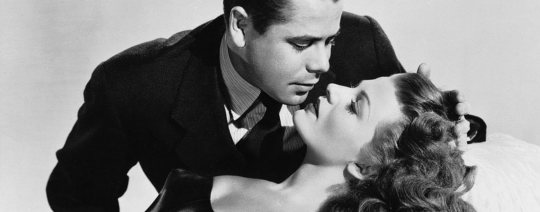
Gilda could be the ultimate example of a film in which a single scene transcends the entire film, making the viewer forget about everything. Some may not have even seen it yet, but they do know of that iconic striptease.
What is film noir without the relationship between the protagonists? What is left in a film noir when we strip it of this element, of those murky and sickly as well as fascinating relationships?
Make no mistake: the sophistication that characterizes film noir would be meaningless without the protagonists. And in this sense, Gilda has its own characteristics, something of a film noir, but with a development in its characters very different from the genre.
Here, the femme fatale doesn’t need a man to lead "to perdition." Her reason for being isn’t that, far from it. Therefore, Gilda breaks with that film noir rule; here the protagonists drag each other in that whirlpool that only brings misfortunes, which is resolved in a totally different way in this film.
One of the characteristics of film noir is that of the love triangle although, in this case, we could speak of two love triangles, one of them very particular. At the beginning of the film, we see Ballin rescue Farrell from the street, from the underworld of Buenos Aires.
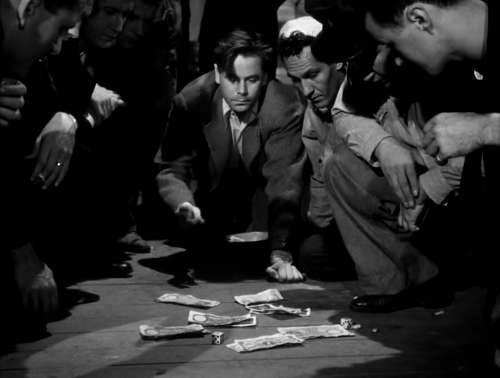
He has saved his life; one feels indebted and the other responsible for the act. Next we see the third component of this triangle, the cane. A cane that hides a a deadly weapon.
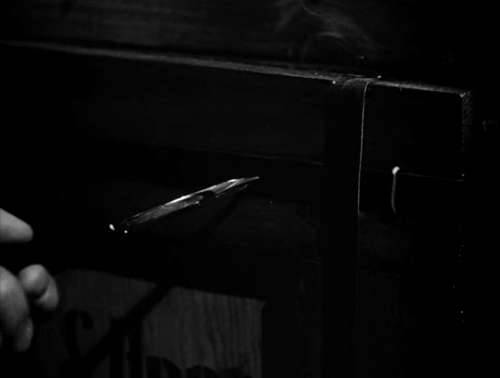
Ballin: It is a most faithful and obedient friend: it is silent when I want it to be silent, but talks when I want it to talk.
Farrell: Is that your idea of a friend?
Ballin: That is my idea of a friend.
It’s not trivial to consider that cane as another member of the relationship between the two men; in fact, when Ballin introduces Gilda, Farrell says: "I thought we were three already”, referring to the cane.
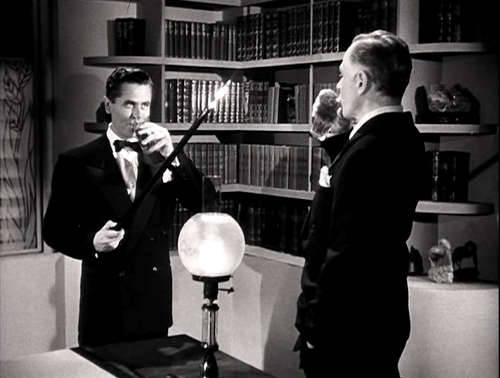
That strange triangle is agreed upon and closed with the following words by Ballin: “This I must be sure of, that there is no woman anywhere. Gambling and women do not mix.” Farrell becomes Ballin's right-hand, his best friend and confidant.
And there it is, the second triangle, and this time, the real one. Ballin appears with his new wife, Gilda, Farrell's old love. As they walk up the stairs, guided by Gilda's siren song, Farrell mumbles an "I hope everything is as before", which sounds more like a wish that he knows won’t be fullfiled; his relationship with Ballin isn’t going to be the same as before. He stands at the bedroom door while we see on his face that he recognises the voice, that voice that he has heard sing so many times in the past.
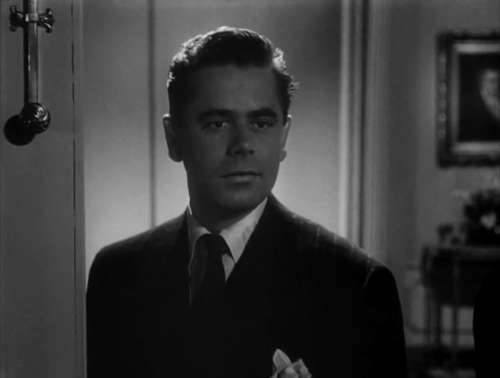
Ballin tells him that "he seems stunned" listening from the doorway. When Farrell reminds him of the "no women" pact, Ballin replies "my wife is not a woman.” And it is then when Ballin asks Gilda the question:
-Ballin: Are you decent? -Gilda: Sure I’m decent.
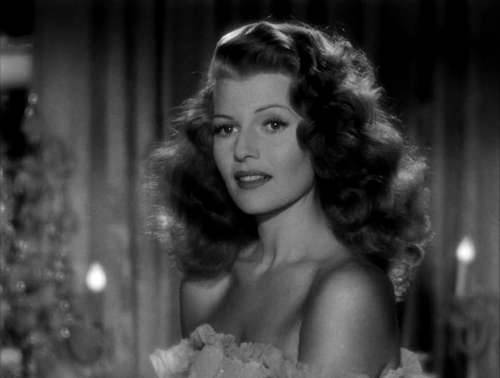
The tension between Gilda and Farrell is evident. We don't know what happened between them (that could be another movie), but the wound there is palpable; Ballin is no stranger to that, he realises it perfectly. The Casino workers notice too, in fact they joke about it. When Ballin asks Gilda not to call him "Mr. Farrell", but Johnny, she says "Johnny is a very difficult name to remember and very easy to forget."
And here that obsessive triangle unfolds, so obsessive that, despite Ballin's suspicions that Johnny and his wife knew each other from before, he asks him to stay near her, to take care of her. It seems to be a game that Ballin enjoy. That macabre game reaches its height during a dinner in which the three share a table, in which they toast the misfortune of the woman who made Johnny suffer:
Ballin Mundson : Now then, before we were interrupted, I believe we were about to drink a toast. So: disaster to the wench who did wrong by our Johnny. No, Gilda? You won't drink to that?
Gilda : Why not? Disaster to the wench!
When Farrell admits to Ballin that they knew each other from before, he says, "I taught her what she knows." Up to that point we can imagine what Johnny has meant in Gilda's life. Thinking that Ballin is dead, Gilda and Johnny get married in a wedding that could predict what comes next: we only see her through a window, through the rain that falls outside.
Johnny begins to punish her by leaving her alone, humiliating her, to such an extent that she has to go see him at the office: “Hello. Do you remember me? I am Gilda, your wife ”. Farrell enjoys humiliating her; He lights her cigarette by placing the lighter at waist height, so she has to "bow" to light the cigarette.
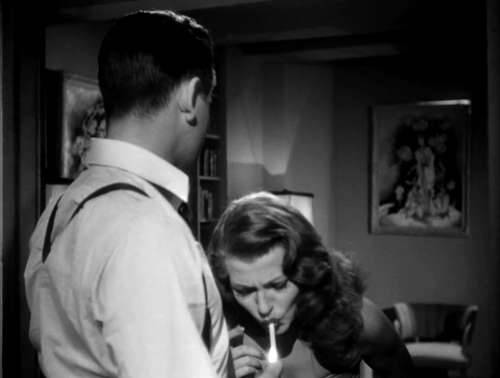
She married Ballin out of revenge on Johnny, and he marries her to humiliate her. So much so, that their new home is dominated by a huge portrait of Ballin. She is a prey to her past. She tries to run away from Johnny, but wherever she tries to go, he torments her.
When everything is over, Gilda surrenders and decides to leave the country; He returns to ask her to leave together, while apologizing for his behavior: “We were both scoundrels. Isn’t it wounderful". That obsessive triangle becomes a couple of neurotics, in which with their strange relationship of emotional dependence., they feed each other until they reach the point of recognising that it’s wonderful that they don’t have to ask for forgiveness or that anyone is guilty of anything, the two have been just as awful.
But Ballin returns from the shadows to claim what is his: his wife.
But prophetically it’s a member of the previous triangle, the knife hidden in the cane, that is going to solve this triangle, and this time forever. Ballin dies at the hand of his best friend,
The tagline for the film announced that "there is no woman like Gilda". There may not be a more iconic female character in film history. She has such strength on screen that perhaps because of that the viewer may not have been able to judge her in depth. She has nothing to do with the rebellious woman we all thought her to, nor is she a man-eater; Gilda is simply different. She is a woman with an apparent happiness, that hides an immense sadness and melancholia.
A woman who complains about "so many people and so much loneliness.” Her need for attention and love is palpable. From the moment she meets Johnny Farrell, The expression on her face changes: the past has returned. When Johnny first goes to the ballroom run by Ballin, he meets a beautiful woman and, when he asks about her they tell him: she is a harpy.
Harpies, fantastic beings with the face of a woman and the body of a bird of prey. In Greek mythology, they were the beings in charge to enforce the punishment of Zeus to Fineo, stealing his food. Later on, various traditions gave them malevolent connotations, carriers of catastrophes.
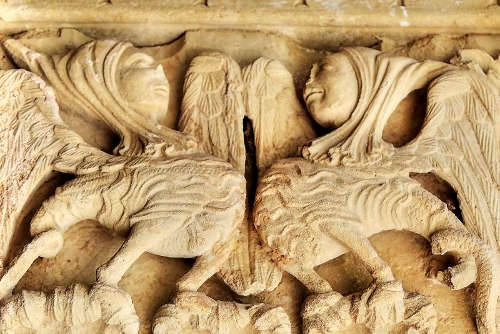
When Ballin appears to be dead, Farrell finds himself between two harpies reading Ballin's will and instructions.
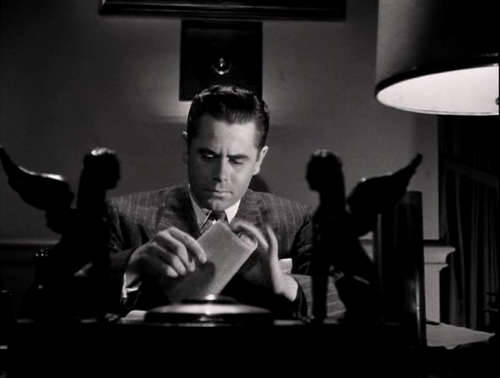
Gilda can’t be considered the classic film noir femme fatale. She seeks to torment Johnny, but in order to make him jealous, her end goal is not money, as is often the case with the film noir woman; She is in love with him, she marries Ballin for money, yes, but it’s a question that Ballin was not oblivious to when he married her; for him she is a beautiful and hungry little girl.
He feels like a man, he realises himself as such by feeding her. But Gilda's wound is very deep; referring to Farrell, she says: "I was once loyal to a man, and look what happened." Ballin justifies her marriage to him: “She said she was born the day she met me. The three of us have no past, only future. Interesting, right?". Those same words are the ones Johnny used when he met Ballin, who had been born the day he met him.
There are two very important themes in Gilda: hatred, hatred that’s been shaped by Gilda’s pain. She reiterates many times how much she hates Johnny, but it’s a simple excuse; She loves him so much that she has had to turn the feeling into hate as a barrier against pain: “Hate can be a very intense emotion (…). Hate is the only thing that warms me. ”
And Farrell in turn thinks about her: “I hated her so much that I couldn't forget her. I was in the air I breathed.” The reunion with Johnny makes her want to plunge into a self-destructive spiral that, that would destroy everything she knows. Her words to Johnny are very significant: "I hate you so much that I would destroy myself to drag you down with me."
But the love game she plays with Johnny reveals something else: She doesn’t hesitate to be seen with other men to arouse his jealousy, a game into which she falls very easily. At the Carnival, with another identity, with a mask, they dance as it seems they did before. She’s mischievous: “I can help you regain practice. I mean dancing. "
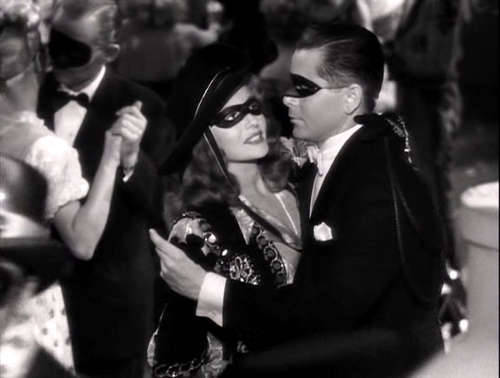
He asks her to throw her hat back. He shoves her away violently while she laughs amused. The love-hate game between them is very powerful. We can’t forget the famous slap that he gives her ... although he doesn’t escape a few himself. The game of erotic power play and violence often present in film noir is very noticeable here.
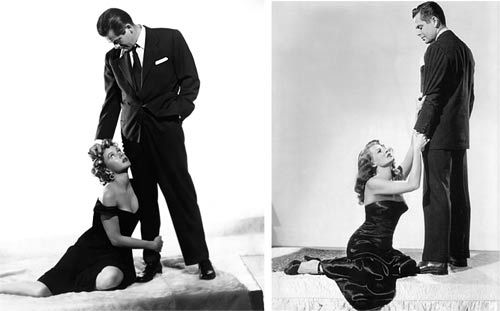
When he takes Gilda home, she does’t hesitate to stress again and again that they are alone. He can’t avoid the temptation and goes up to the bedroom. She has removed her disguise, she is Gilda again, a Gilda in the shadows. They hesitate whether to approach each other or not: "I hate you so much that I think I'm going to die from it ... darling." Their neurotic behaviour could be summed up in this phrase, in that kiss during which the two explode when they say that they hate each other to death.
Gilda’s death drive leads her to an obsessive superstition, another important theme in this film, in which she leaves her life and actions in the hands of that belief, she sees signs everywhere and subjects her life to that destiny. The night the three of them toast to the misfortune that Johnny suffered (herself), she is afraid to drink the glass, as if consuming the champagne closes a pact with the devil.
But after a moment of doubt, she drinks without hesitation, as if that liquid were a poison and she wanted to die right there. She doesn’t care that she’s toasting to her own misfortunes. She’s so superstitious that when she tells the maid, she asks her not to repeat it. Whilst being in luck at roulette someone says "lucky in the game, unlucky in love", and she stops playing to avoid tempting luck. On her wedding day with Johnny, a lonely, sad and glamorousness wedding, a wedding that we as spectators only see through a window, she says: “The rain has stopped. Maybe it means something. ”
Of course Gilda is not the typical film noir woman. She is a tremendously sad woman, sadness caused by love, and who seeks to flee from herself, from everything inside herself.
A woman afraid of her husband and destiny, fearful of life, in a word. In the end, feeling cornered by everyone, the only thing left for her to do is a farewell worthy of her, an iconic dance: She knows she’s being observed by everyone, especially by Johnny. A song in which she asks to blame someone else, "Put the blame on me."
Don't blame Gilda; she’s already fleeing Buenos Aires. But Johnny asks her to go with her. What was Gilda looking for? To be loved. Nothing more, nothing less. Gilda represents the “whore” who wants to emancipate herself to become a mother. Almost no woman in film noir is a mother, a femme fatale is not a mother, she’s a temporary distraction and obstacle to the hero.
But Gilda wants to escape such a condition, and we could really see her as a loving mother and living together with Johnny. In Gilda the woman could be seen as a symptom of the man, Gilda comes to substitute those other symptoms that these men have (sadistic in the case of Ballin, vengeful in the case of Farrell), and take them out on her.
Film noir always plays with appearances: nothing is what it seems to be. But in Gilda, this premise turns to "but in the end everything was what it seemed to be." That game of appearances, like at the Carnival, ends when the participants remove their mask, this time, in a violent way. Neither is Ballin the good Samaritan who saves lives altruistically, nor is his Casino his main activity, not even his death is true. We are shown his shadow on different occasions, in profile; we never see him fully.
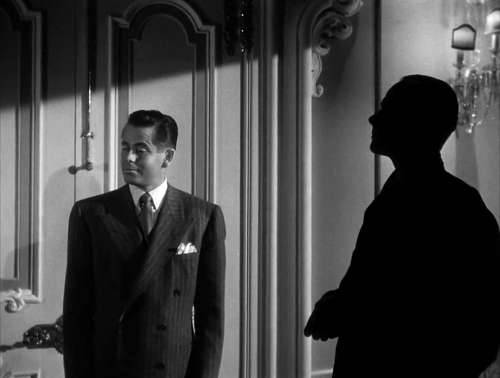
Gilda and Johnny’s life is also a lie, to bear their pain. The Casino is itself a lie, a place that Ballin uses to hide his work, and that he has arranged to be able to see without being seen. His office is upstairs, from where, thanks to a set of lights, blinds and windows, he can see everything, like an omniscient God.
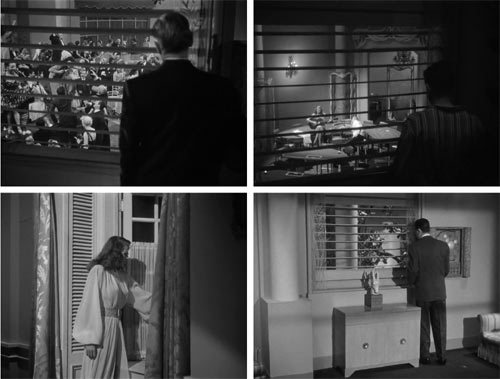
It’s the only way out of the suffocating atmosphere of the game room. Gilda is no stranger to what that game of points of view can provide to her, on two occasions she knows she’s being observed by Johnny, she seeks to be observed by him, but she doesn’t see him watching her, as if he doesn't want to see her face and guess what she’s thinking at the moment. The final moment, Gilda’s iconic dance, seems meticulously prepared for him to observe her, but also for him to see how others look at her. What does Farrell do? He stops her. He can’t stand what’s happening.
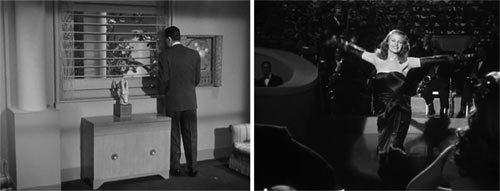
Doesn't that moment remind us of this one from Paris, Texas?
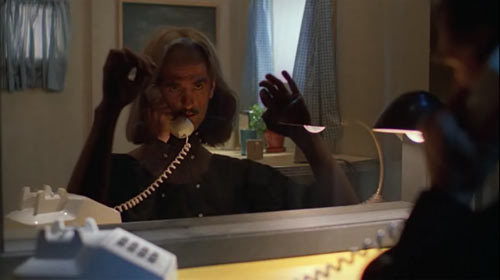
Or this one?
Two absolutely different women, but in a sense mirrors of each Gilda is the whore who wants to emancipate herself to become a mother; Jane is the mother who emancipates herself and becomes a whore, once Travis appears, she takes the path back to that role of mother. Could that moment that game of points of view, be the beginning of that emancipation, of that path?
That claustrophobic environment and that game of viewpoints is exemplified in Gilda and Johnny's wedding: We only see her through a window, through a rain curtain, we don't even hear what is being said inside the room. We are spectators. But aren’t we during the entire film?
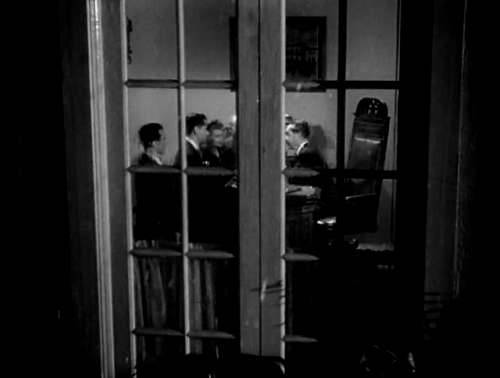
Gilda’s iconic phrase: If I'd been a ranch, they would have named me "The Bar Nothing.", is now more ironic than ever. No, she is not the free woman we were made to believe; she has an owner, Johnny. The mare is back with the stallion.
@purecinema @idasessions @missdubois @mad-prophet-of-the-airwaves
#fave#took me ages to write#gilda#gilda 1946#charles vidor#rita hayworth#glenn ford#film noir#40’s cinema#cinema#movies#films#film review#movie review#movie analysis#film analysis#filmista
55 notes
·
View notes
Text
‘Wallflower’ Character Profiles: The Reader and Raihan
URL to story here: https://archiveofourown.org/works/22558033/chapters/53904451
No one: Absolutely no one:
Jeralee:
I had this sitting in my drafts folder and didn’t get round to posting it up.
I thought it would be fun to write some profiles, starting with Reader and Raihan from Wallflower if anyone’s interested.
I write pretty dark stuff, and so Reader’s profile made me sad :(
...............................
Raihan:
A ladies man, a playboy; he frequents nightclubs and has one night stands but when he meets the one, he stops and becomes totally devoted (which is what happened in this story lol). He loves to flirt and is a big flirt himself.
Deep inside he is a hopeless romantic and falls in love easily and he also falls in love quickly. He has an ideal type of woman and likes it when his S/O is stronger than him, so he falls for the Reader pretty quickly because she ticks all this boxes.
He is frequently rumoured to be dating head cheerleader Alicia, which annoyed Reader. A flashback reveals that he is used to his fans and haters alike, and apparently he hugs female fans. He often entertains his fans and does not shy away from attention from girls who were only interested in him due to his looks and seeking fame.
His social media and popularity doesn’t appear to bother him on a surface level but he occasionally shows a vulnerable side to Reader such as showing anger and telling her he was once stressed and also demonstrating protective and possessive behaviour (in the good way lol). During battles, he has no problem putting on a persona which the public loves. Outside of battles, he is a nice, calm and down to earth, normal guy.
He gifts her a Dreepy which is how she found out about his house. He also helps her brother catch a Galarian Ponyta. He owns a small house in Hammerlocke and becomes embroiled in Reader’s adventures.

#I really wish there were more raihan gifs
.....
The Reader:
I’ve never really described Reader in any detail - no age, no first name or surname, no height, no weight, nothing lol. Even if there was a hint of her name or feature I’d deliberately write something to stop it before it happens. That’s how much of a stinker I am.
Anyway she is quite the complex character.
Although she is described as being introverted, socially awkward and quiet, she is really nice and caring and puts others before herself. She gradually becomes comfortable with people over time and only shows an extroverted side to family and close friends.
She also tends to overthink, has anxiety, is highly neurotic and has a fear of intimacy which stems from abuse she suffered in the past (personally I wanted to expand more on this in the story tbh). She suffers from low self-esteem and often experiences loneliness. However, when she is with Raihan, he brings the best out of her and encourages her to be strong.
Reader is from Johto but she moved to Galar to work in the Wild Area Pokemon Nursery near Hammerlocke as a daycare assistant and EV trainer. She looks after babies, delivering pokemon eggs and EV training pokemon, up to 5 at a time. She is a ‘platinum’ certified Pokemon Breeder (note: I myself don’t know what dis means but I guess it means she good).
She has a foster family who are Pokemon Breeders and an older foster brother called Glenn. When she was young, she had a hard time fitting in at school and was bullied by a schoolmate who wanted to become the Champion, which made her disillusioned with the dream.
Unfortunately, the experience would impact her and she would develop a harsh outlook on life. She prefers Pokemon over people and has zero interest in social media.
Her pokemon are extremely strong, even her house ‘mon which include:
Poliwag, who refuses to evolve and keeps an Everstone tied around its tail
Drifloon, aka Driffie
Espeon, aka Espie
Phantump, whom she met in the Glimwood Tangle when she first moved to Galar.
Goomy. Gifted to her by Raihan. It prefers to sleep rather than train.
Dreepy. Gifted to her by Raihan. Has a naughty nature.
Her current competitive team consists of the following:
Metagross - an unwanted pokemon egg given to her by her foster parents and the first Pokemon she EV trained. She trained it so it has high attack, speed and HP.
Garchomp, the Gible that tried to save her from a Drudiggon (nicknamed Chompy). It has the same EV spread as Metagross. He is protective of the Reader
Tyranitar. He has a timid nature but is a good boi
Starmie. A specia sweeper, Starmie knows thunderbolt and has high EVs in special attack and speed
Whimsicott. I wish I wrote more about this little dude tbh
Togekiss. Same as above
Haxorus. Has same EV spread as Metagross but his attack surpasses everyone’s.
Salamence. Enjoys flying.
Extra: her main pokemon team is actually Metagross, Garchomp, Tyranitar, Haxorus and Salamence.

Thanks for reading!
40 notes
·
View notes
Photo

More news: if a curfew wasn’t enough, maybe a perimeter lockdown will suffice. This means that I won’t be able to visit the cemetery on All Hallows’, a tradition I deeply enjoy and respect as it’s the most important yearly event in my relationship with my ancestors. I won’t lie, I’m pissed. So I’ll be nesting this weekend, and I have picked a few decks based on the Marseille tradition to work on. The latest addition to my Marseille collection is Le Tarot Initiatique by Arnaud Malherbe.
Initiatique means “initiatory”, and if this deck hasn’t already caught your attention with its fabulous artwork and loud colourblock hues, keep reading because it will. These 78 cards are done in just a few colours: yellow, red, two shades of blue (dark and cyan), black and white. This primary palette makes it visually striking from the first moment. The majors and court cards are scenic, and have been modernised from traditional images to be more in the “now”, with evocative characters that have lots of personality. Aside from the people, I want to highlight how the animals in this deck are presented in a fun, charming way which makes me smile.

Because of its Marseille tradition, the numbered cards (1 to 10 of each suit) are pips. While they are also modern, with a clear-cut geometric vibe and the same colourblock we have seen before, they are very loyal to the Marseille deck. The backs are kind of trippy when looked from afar because they are imprinted with a geometrical pattern. Also, it’s important to highlight the size of these cards, as they are large (think oracle size, but taller and narrower). Since we’re talking about production, let me add that the magnetic flap box is sturdy and superbly designed, with illustrations even inside of it.
Next we have the booklet (in French), with full colour illustrations and almost 130 pages. It includes a preface about tarot as heritage, an introduction to tarot and its structure, card messages, spreads, bibliography, an a very interesting chart with the three degrees in which the majors can be read (neurotic behaviours, quest for balance and spiritual guidance). Within the card messages, there’s a distinction within the majors (with a few pages each, including key ideas for their light and shadow meaning) and the minors (including the courts), which are structured by number instead of suit (something that makes sense in the Marseille tradition) and which are much briefer. However, this is also good to work on the suit + number approach to reading the tarot vs more scenic face cards.
Le Tarot Initiatique by Arnaud Malherbe is a great addition to any tarot collection, and particularly attractive for those who like reading Marseille decks. It is visually appealing, well researched, respectful to tradition and tactfully modernized. The companion booklet is amazing if you can read French, but as it’s a Marseille rooted deck, you can do simply with the images. With its chill and fun vibe and its charismatic characters, this tarot is a playful tool that can get serious and down to business when needed. Head over Arnaud’s site to check it out!
17 notes
·
View notes
Text
Fanfiction Friday Saturday!
I can’t believe I wrote this entire post in advance and then forgot to actually publish it... twice.
Anyway, below the cut you’ll find all of the Lucifer fanfiction I’ve recommended on Twitter over the past couple of weeks. Enjoy!
Title: Angel in the RAF
Author: Voodoohavk
Rating: T
Type: One Shot
URL: https://archiveofourown.org/works/14098329
Author summary: When investigating the death of a soldier Pierce lets something slip alluding to Lucifer having served in the (heavenly) army once upon a time leading to more than a few raised eyebrows.
Title: An Inevitable, Unhappy Ending
Author: SomeoneAsGoodAsYou
Rating: T
Type: One Shot
URL: https://archiveofourown.org/works/14787056
Author summary: In which Lucifer is not in love, and Chloe is not going to let him break her heart.
Title: Sublime
Author: Tarysande
Rating: T
Type: One Shot
URL: https://archiveofourown.org/works/14702589
Author summary: And though the smile returns almost before she notices it was gone, his eyes remain wary. She doesn’t miss the subtle stiffness in his posture or the way his fingers twitch before reaching for his glass. She’s seen children with that look. She’s seen beaten dogs with it. She hates seeing it on one of the faces most precious to her.
Title: Onde Termina o Céu
Author: RushAndTomatoJuice
Rating: M
Type: One Shot
URL: https://archiveofourown.org/works/20456945/
Author summary: Chloe Decker, badass – if somewhat generally hated by her coworkers – LAPD detective, had lived most of her life in blissful ignorance. She’d stopped believing in magic when she was seven. It was not how the world worked. She knew that just as much as the next person. She was a woman of logic. Her entire police career had been built around it, her life depended on it, especially after the Universe had decided to take her dad away from her.So it was just her luck that a stranger who called himself the devil would waltz into her life and turn it upside down.
Title: In The Beginning
Author: Pellaaearian
Rating: T
Type: One Shot
URL: https://archiveofourown.org/works/14808770
Author summary: Chloe and God have a long-expected confrontation.
Title: Angelic Behaviour 101
Author: Mere_Mortifer
Rating: T
Type: One Shot
URL: https://archiveofourown.org/works/18360275
Author summary: Based on the prompt: Angels have certain instincts ingrained in their species- neurotic need for neatness, extreme protectiveness over people and things they consider “theirs,” and an extreme fascination by anything shiny. Cutting off his wings muted these instincts somewhat, but now that the wings are back, so are the angel instincts- full force.
Title: Full of Possibility
Author: PixelByPixel
Rating: T
Type: One Shot
URL: https://archiveofourown.org/works/15944984
Author summary: When Trixie finds a feather on her mother's coat, she doesn't want to bother her mom about its origins. Instead, she turns elsewhere for answers about what has been happening recently.
Title: Told You I'm Not A Method Actor
Author: Endelda, NostalgiaKick
Rating: T
Type: Multi-Chapter
URL: https://archiveofourown.org/works/19365943
Author summary: A night at Lux takes an unexpected twist.
Title: That Ancient Serpent
Author: Namarie
Rating: T
Type: Multi-Chapter
URL: https://archiveofourown.org/works/19355008/
Author summary: As Lucifer and Chloe grapple with the meaning of the prophecy, Lucifer also struggles to deal with the consequences of his own self-hatred. All of that is before a group of cultists decide it's time for another, more ancient prophecy to be fulfilled...
Title: Misguided Ghosts
Author: petrichorishly
Rating: G
Type: Multi-Chapter
URL: https://archiveofourown.org/works/23313997/
Author summary: Chloe isn’t expecting the world when she moves into Dire Oaks after losing her apartment, her marriage and the respect of her coworkers. But nothing could have prepared her for the 30-year-old cold case literally haunting her new home.
Title: Moving Up, Slowly
Author: sequence_fairy
Rating: T
Type: One Shot
URL: https://archiveofourown.org/works/12920304
Author summary: Chloe kind of hates him for it, but like she said: divorced, not dead, and also not blind.
Title: Happy Detective Day!
Author: violent_ends
Rating: T
Type: One Shot
URL: https://archiveofourown.org/works/23790130
Author summary: Now that Lucifer is in Hell, Chloe has completely forgotten that it's the one-year anniversary of that stupid surfer case in which Lucifer decided to focus entirely on her. That is, until a surly demon turns up on her doorstep, thrusts flowers in her face, and tells her, “Happy Detective Day from His Infernal Highness!” Or: the marvellous top-side journey of Saleos the peace-loving demon.
#Lucifer Fanfiction#Lucifer Fanfic#Lucifer#Fanfiction Recommendation#Lucifer Fanfiction Friday#Lucifer FFOTD#fanfiction recommendations
54 notes
·
View notes
Text
“The Saturday Interview: I Am In Eskew Podcast” —Recovered
The podcast is called I Am In Eskew; it’s a horror / weird fiction show delivered as a series of dispatches from a vaguely Central European city.
Eskew is a place that is, both spatially and psychologically, off-kilter. The streets wind too far in on themselves, the stairs climb too high, and both buildings and inhabitants can act in peculiar, obsessive, or frightening ways. And every episode we follow the narrator, David Ward, a kind of semi-unwilling immigrant to the city, as he finds himself stumbling into new aspects of Eskew. As for me, I’m a writer in London, working in digital media for the charity sector; I’m writing and narrating Eskew sort-of-anonymously. Not for any kind of grand scandalous reason, but because I think it adds to the fun and helps to keep the conceit alive a little bit.
Ah...that explains why I couldn’t find your name when I was researching for this interview. I thought my skills were slipping! I think it’s very interesting that Eskew focuses on horror based around spaces and buildings. Is this something of particular interest to you?
Yes, definitely! I think there’s a rich ream of horror, from The Haunting of Hill House to Ghostwatch, that delves into the idea that certain places can simply go wrong - and once these bad environments have been established and ostracised by society, they can’t be exorcised. They simply keep accruing power through the individual stories that play tragically out in their shadow.
I mention a real-life example of that kind of bad architecture in one episode; the Pope Lick Bridge in Kentucky, a place that looks and feels so sinister that it developed its own local folklore about a goat-man who attacks people who stray too close to the edge - and which has ended up resulting in deaths as visitors peer over the side trying to get a peek at the monster.
I find this kind of stuff fascinating, because it plays into my own paranoia about environments, and my dislike of ghost stories with explicably human antagonists. Like David says in the first episode, people aren’t frightening. Places are frightening.
If I’m sitting alone at home on a dark and stormy night, and I glance nervously up towards the bedroom doorway, my fear is not that my house is being haunted by a spirit called Mabel who died in the 19th century at the age of fourteen and is constantly seeking her favourite teddy bear...because all of these details both humanise her and make her ridiculous.
My fear is that there will be something standing in the doorway, because the doorway is where things come to stand.
Because unoccupied spaces, in our imaginations, must find something to fill them.
Could you describe some of your creative influences?
Thomas Ligotti is probably the writer I’m trying to crib from the most. Not so much in terms of his pessimism (or his love of puppets as a horror motif, which I can’t really get behind), but I see him very much as someone who bridges the gap between American horror and European absurdism. Some of my favourite stories of his - The Town Manager, Our Temporary Supervisor, The Red Factory - are hilarious as comedies! They’re very much scathing satires on our inadequate human response to the inexplicable and awful.
Junji Ito is also a big influence, in particular, his masterpiece Uzumaki: a collection of short stories about a town that’s driven mad by the symbol of a spiral. The brilliance is in the inventiveness with which he builds an anthology of horrors, with variety and with mounting awfulness, while playing on that simple motif.
I see Ito’s work as very much in the spirit of some of the most classic horror of all; Ovid’s Metamorphoses, where the threat comes not from an external monster, but from our own bodies and minds, transforming at the whim of cruel, fickle and obsessive gods...which feeds into a lot of what I’m trying to do with Eskew!
I usually try and avoid thinking about Lovecraft as an influence, even though David is clearly an obsessive, neurotic first-person narrator in the Lovecraft/Poe mould. I think there’s a lot of baggage around what constitutes ‘Lovecraftian’ fiction, and I didn’t want to set up false expectations by referencing him (like the idea that there might be some monstrous cosmic intelligence behind it all).
I really enjoy Lovecraft too, especially something like “The Shadow Over Innsmouth.” I think the idea of monsters living in the sea near the town and the strange, inexorable link the townspeople have with them makes it a lot creepier than something like “The Call of Cthulhu.”
Yeah! I think the elements in Lovecraft that have made him so franchise-friendly (these brilliant alien races and gods) have eaten away at the edges of Lovecraftian horror, bringing it closer to something that can be quite kitsch, even a kind of steampunk pastiche at times. With Eskew, I’m trying to keep to something I see in Ito, or in Ligotti, where any antagonists, whether human or otherwise, are only symptoms of something worse, something that’s simply a force of nature.
I see the city of Eskew as being a bit like a literal cancer in that sense - a highly complex structure where some of the cells (or in this case streets, art galleries, citizens...) have started to lose their original sense of self and are obsessively spiralling off in other, destructive directions...
What made you decide to do I Am In Eskew as a podcast, rather than as a graphic novel or book?
Honestly, it’s a lack of talent in the first instance, and a lack of discipline in the second!
Writing it as a podcast was my partner’s idea (she’s also the occasional voice of Riyo, an investigator looking into David’s disappearance, and she copy-edits every episode with me) - I knew I wanted to write a series of horror short stories based around the theme of urban isolation and weird architecture, but I was really struggling to get started.
She suggested that recording it as a podcast would force me to keep to a schedule, and hopefullyit might even give me some audience feedback to keep me excited about the project.
So it was a pragmatic choice, but it’s one I’ve really come to be thankful for! I think the medium is perfect for bare-bones, atmospheric horror storytelling (Knifepoint Horror is probably the best example of that ‘lonely voice whispering in your ear’ kind of fiction), and there’s an incredibly welcoming, friendly, mutually-supporting community of listeners and creators online.
Once the podcast is complete, I think I’d definitely like to look at compiling all of the episodes, editing and improving them, and turning it into a full-length written anthology. I’ve definitely made a few continuity slip-ups along the way that I’d like to correct, apart from anything else.
I’ve enjoyed Riyo’s episodes too, especially now that she’s directly looking into ‘hostile environments’. I feel like the contrast in tone and narrative style help to strengthen the series overall. Do you intend for the story of I Am In Eskew to have a specific ending in the future? If so, have you decided on the arc of the story?
I think David’s story (and Riyo’s) needs to be a finite one, definitely. In my experience, most successful protagonists in serial horror tend to be investigators, or monster-hunters. That choice of profession makes them witnesses to the story, rather than victims - effectively, they’re exempt from the psychological cost of whatever happens.
With David, I very much wanted to avoid that sense of safety; I want the horror to keep taking its toll on the character, episode after episode - which means that eventually he does need to find some kind of resolution!
Otherwise that psychological cost starts to seem fraudulent, and the whole thing turns into a predictable game of ‘David sees something horrible, then miraculously escapes at the last second’ week after week.
So I do know how the finale is going to play out; it’s really just a question of how many more stories I can reasonably invent for the show, without things starting to feel stretched, before we get there.
Mind you, it’s been established that there are recordings from Eskew that have gone missing, so it doesn’t need to end, even if it ends…
Do you have a favourite episode of I Am In Eskew so far?
I really like Episode 3: Excavation. A mysterious digging sickness takes hold in Eskew, with citizens tearing their own hands to pieces just to get into the ground - and in retaliation, a religious cult starts to form, extolling the virtues of the sky and constructing a grand tower.
It’s not necessarily the best-written episode structurally, and definitely one of the crudest in terms of recording quality, but it was the first episode where I felt I was pushing the boat out towards the kind of outrageous, absurdist horror that I really wanted to be writing, where normal human behaviour was just being given a couple of extra screw-turns towards something awful and monstrous.
It was also the first episode where I really saw a few people begin to respond on message boards, so that was really reassuring to me - when it first went out, I was petrified that I’d gone too weird to sustain anyone’s interest.
I tried to pick a favourite episode in preparation for this interview, but I honestly couldn’t narrow it down past five or six. If I really had to pick, I’d probably choose Illumination - the episode about the sinister and compulsive call of an old railway bridge. Are ideas like this based on real examples?
That example definitely is - it’s based on a railway bridge about a minute’s walk from my house! I love that kind of very modern ruin; old brick stacks stood out in the open, arches filled with ivy, graffiti in a place that seems impossible to reach...
There are a few other specific London inspirations (I based the Fish Market on Spitalfields Meat Market, for example), but with Eskew as a whole, I was thinking specifically of hillier cities in Western and Central Europe: Budapest, primarily, but also Lisbon (the trams and cobblestones), maybe a bit of Rome...
I’m used to flat English cities without any kind of panorama, so I find it a ceaselessly astonishing thing to be lost in a city’s streets and suddenly find myself up high, staring down over a sea of winding streets and rooftops...
How do you feel having wrecked people’s appreciation of AA Milne’s poem Disobedience by highlighting how deeply sinister it is?
I’ve actually been driving myself wild trying to decide if that poem is just a nonsense rhyme celebrating bossy children, or if there’s a class-snobbery thing going on (James James Morrison’s mother puts on a golden gown, and goes to the end of the town...does she get robbed there? Is the end of the town so unsafe because that’s where the low-income people live?)
You may have a point there about class. After whatever happens to her happens, the King himself gets involved with a reward. Clearly, she’s a lady with connections! Could you describe your writing process?
My writing process is very much informed by necessity - I commute in and out of London every day and don’t have a lot of free time, so I have to do most of my drafting while standing upright in a crammed train carriage!
Which may not be ideal, but on the other hand, if you’re writing a podcast about the horror of urban life, there’s no better place to find inspiration than a crowded, sweaty, angry Underground train filled with blank faces...
How long does it take you to put an episode together, from first word to the finished product?
I’m very quick; I usually sketch out the episode concept well in advance, then take about a fortnight to draft it and edit. Recording and audio-editing happens very speedily, again out of necessity, on the weekends! I try and devote a day apiece to each.
Turning to the technical side, what do you wish you’d known about creating a podcast at the very beginning?
There’s still an enormous amount that I don’t know! When it comes to even simple audio editing, I’m learning all the time. I very much am still just a schmuck in his living room, talking into a handmade sound booth on his days off - which is the beauty of podcasting, I suppose.
But I’d probably give my earlier self some very common-sense advice like...
...be brave. Stick to a schedule. Know the signs of burn-out. Listen to other people’s work in the medium before you dive in. Stay hydrated so your mouth doesn’t make those disgusting wet sounds when you’re trying to talk. Never forget that this should be fun, above anything else.
What motivates you to keep producing episodes?
Honestly? Seeing that it’s connecting with people. Spooking people. Entertaining people. That means everything.
If people would like to engage with you or support you online, what’s the best way to do that?
If you’d like to support the show...please do just shout about it! Tell your friends, leave a review on iTunes. It really makes a huge difference.
If you’d like to chat, we’re also on Twitter: https://twitter.com/eskew_podcast
14 notes
·
View notes
Text



Dean Winchester/Reader | Dean Winchester/OFC
↠ Come tomorrow, feel no pain Tumblr | Ao3 Rating: Explicit Word Count: 8,894 Warnings: Explicit sexual content; Drinking; Self-worth issues; Reckless use of pet names on Dean’s part
Summary: 5 times she offers him comfort + 1 time Dean repays the favour. Or: Dean gets a bunch of nice things until they finally, finally, have sex.
↠ First Class Tumblr | Ao3 Rating: Explicit Word Count: 2,199 Warnings: Explicit Sexual Content; Unsafe-sex
Summary: The reader, a stewardess, notices that a certain green-eyed stranger is very nervous at the prospect of flying. Of course, she wants to help him relax.
↠ Sweet Apology | Ao3 Read on Tumblr: Chapter 1; Chapter 2; Chapter 3 (Epilogue) Rating: Explicit Word count: 13,311 Warnings: Explicit Sexual Content Tags: Fluff & Smut, a smidge of Angst; Misunderstandings; Porn with Feelings; Arguing; Reader has a crush on Dean
Summary: The plan was to watch a movie in Dean’s room, but without Sam to help her feel less awkward, it’s no surprise that she ends up saying something stupid - and make Dean think she dislikes him, of all things, when she has a gigantic crush on the guy. They start yelling at each other, soon enough they’re kissing, and then - well, Dean’s bed gets put to good use. It kind of sucks, though, that as soon as they’re done Dean puts his clothes back on leaves her like nothing happened. Wham, bam, thank you ma'am. Well, not really. He’s just absolutely clueless. I swear, if these two don’t open their mouths and talk…

Lucifer/Reader | Lucifer/OFC
His quiet whispers just fuel the desire ↠ Tumblr | Ao3 Rating: Explicit Word Count: 12,129; Two chapters Warnings: Drinking; Self-worth Issues; Explicit sexual content; Unsafe Sex
Summary: “So, what do you say, love? Yes or no?”, Lucifer interrupted her thoughts, oblivious, gently cupping her cheek with one hand. He stroked the skin there, seeming mesmerized by the softness of it. Fluttered and disbelieving, she huffed a laugh. “How can I say no?” she mumbled, leaning against him without realising. Her eyes languidly passed over his pretty dark eyes, down to his lips curled into half a smile, and they settled against the smooth skin of his neck like attracted by a magnet. “How could I say-”, but she couldn't finish the sentence, because suddenly her mouth was busy kissing the skin she was just admiring, and wow, why did she hesitate, again?
Close Quarters ↠ Tumblr | Ao3 Rating: Explicit Word count: 5,728; One-Shot Warnings: Explicit sexual content; Semi-public sex; Dirty Talk
Summary: The fact is, the closet really is tiny and with her standing up they would be nose-to-nose if it weren’t for the height difference. He's more than a head taller than her, and this close she would need to barely move to kiss the column of his neck. Her eyes follow the line of tendons under his skin from his jawline, down to where his shirt obstructs the view. Unable to resist the pull of his gaze, she raises her eyes to meet his. “Hi”, she says again, as softly as the atmosphere requires. Her stomach is already tied up in knots. Lucifer's smile softens, and he angles his head so that their lips are even closer together. “Hello, there."
Lucifer/Chloe Decker
Angelic Behaviour 101 ↠ Ao3 Rating: Teen&Up Word count: 12,443; One-Shot Warnings: Self-worth issues; Talk of past abuse
Summary: Based on the prompt: Angels have certain instincts ingrained in their species- neurotic need for neatness, extreme protectiveness over people and things they consider “theirs,” and an extreme fascination by anything shiny. Cutting off his wings muted these instincts somewhat, but now that the wings are back, so are the angel instincts- full force.

Richie Tozier/Eddie Kaspbrak
Go on, it’ll be late soon ↠ Ao3 Rating: Teen&Up Word count: 8337, One-shot Warnings: Internalized Homophobia
Summary: And Richie’s in love, in love, in love, now that it’s all about to end more than ever. He spends the next three days thinking how easy it would have been to lean down and kiss Eddie’s bloodied mouth – because, to be fair, that doesn’t sound any worse a promise than slicing your hand on a broken bottle to swear that if, when, needed he’ll be back to do it all over again.
Or: five times Richie almost kisses Eddie and one time Eddie takes matters into his own hands.
Do automata dream of electric spaghetti? ↠ Ao3 Rating: Explicit Word count: ?, 14 chapters Warnings: Homophobic Language, Internalized Homophobia, Explicit Sexual Content
Summary: “Oh fuck,” Richie moans. “Please don’t let it be a dead body, I will so vomit.” But now that he can see it better, the stripe of skin that's peeking out of a sock is too smooth to be human, it reminds more of a— "Doll." The word leaves his lips with a not small dose of relief. He hooks a finger under the sheet that covers it and, keeping as far away from it as possible, he lifts it up and away. There's a boy underneath. Well, it's a doll, Richie wasn't wrong about that, but it looks like a boy, roughly Richie's age. The Uncanny Valley effect is difficult to ignore: its face of the doll is alarmingly realistic, and so are the brown locks of its hair and the proportions of the body. He keeps waiting for it to blink his eyes open.Richie waits. It doesn't blink.Until one day, it does.
(Or: Richie is lonely, Eddie is an automaton rotting away in Neibolt House, and the Turtle decides to play matchmaker in a very unorthodox way.)
One for the money, two for the show ↠ Ao3 Rating: Explicit Word count: ?, 8 chapters Warnings: Explicit Sexual Content
Summary: Richie is a famous actor, and Eddie a college student who has never hear of him before. When they get papped arguing in public about a bad parking job, the media spins to story to make Richie seem like an homophobic asshole-nevermind that Eddie and him were already making out minutes after the photos were taken. There's one obvious way to clear Richie's name: pretend that Eddie and him had been dating all along.
Toucha Toucha Toucha Touch me ↠ AO3 Rating: Explicit Word count: 11306, One-shot Warnings: Explicit Sexual Content, Mentions of homelessness and malnourishment
Summary: “Who the fuck are you?” Eddie exclaims before he can stop himself, and the man turns to face him with a shriek. "I have a dog, you know? He’s like half wolf or something, if you don’t get the fuck out my apartment I’ll tell him to attack!” The man, incredibly, laughs again, this time less hysterical and more plainly awkward. “Yeah, uh, about that…”
Or: Eddie brings a stray dog home. Turns out, it's a werewolf.
35 notes
·
View notes
Text

Character Flaws Meme
No one is perfect, so every character has their flaws. Write down your muse’s six worst Tragic Flaws and how they embody them, and tag your friends. Feel free to use [this list of character flaws] if you want!
Tagged by: meself again Tagging:
Aimless – Devoid of direction or purpose.
While he most definitely has a purpose (guarding the ruins and objects within), he’s not like the other gargoyles who stay immobile and at rest until a threat arises. He prefers to be active and wandering the area. There are times where his mind is more rested, no paranoia, threats, or wild emotions to deal with, and he can entertain himself with aimless activities and his surroundings (he likes to roll stones down the broken stairs and sometimes he just lazes around like a big cat)
Deranged – Mentally decayed. Insane. Crazy. Mad. Psychotic. / Disturbed – Showing signs or symptoms of mental or emotional illness. Confused, disordered, neurotic, troubled. / Anxious – Full of mental distress or uneasiness, because of fear of danger or misfortune; greatly worried; solicitous.
His mind isn’t all that stable, his thoughts jump around and are troubled. He gets uneasy, anxious and violently paranoid. His thought processes are messy and he doesn’t always understand the consequences of things.
Erratic – Deviating from the customary course in conduct or opinion; eccentric: erratic behaviour. Eccentric, bizarre, outlandish, strange. / Fickle – Erratic, changeable, unstable – especially with regard to affections or attachments; capricious. / Finicky – Excessively particular or fastidious; difficult to please; fussy. Too concerned with detail. Meticulous, fastidious, choosy, critical, picky, prissy, persnickety. / Perfectionist – A propensity for being displeased with anything that is not perfect or does not meet extremely high standards.
He’s incredibly fussy and particular, but also has a habit of changing his mind quickly and of being easily offended and violent in his reactions if things aren’t just so. If he suddenly doesn’t like something anymore or deems it not good enough, it gets smashed up in a brutal fashion.
Fanatical – Outlook or behaviour especially as exhibited by excessive enthusiasm, unreasoning zeal, or wild and extravagant notions on some subject. / Fixated – In psychoanalytic theory, a strong attachment to a person or thing, especially such an attachment formed in childhood or infancy and manifested in immature or neurotic behaviour that persists throughout life. Fetish, quirk, obsession, infatuation. / Obsessive – An unhealthy and compulsive preoccupation with something or someone.
He has a fixation with ‘treasure’ and things he believes are special, he’s obsessed with gathering more things and protecting what he has. He gets anxious and dangerous if something threatens his hoard (whether the threat be an evildoer or its a bird hopping around too close). His ingrained task of protecting magic can lead him to fanatical extremes too.
Fierce – Marked by extreme intensity of emotions or convictions; inclined to react violently; fervid. / Overzealous – Marked by excessive enthusiasm for and intense devotion to a cause or idea. / Overprotective – To protect too much; coddle. / Stubborn – Unreasonably, often perversely unyielding; bull-headed. Firmly resolved or determined; resolute.
When it comes to protecting his things and his territory, he is fierce and definitely inclined to react violently. He is devoted to his given task and those he serves. He would do anything to protect what’s in his care, going to extremes easily and there is basically nothing you can do to stop him.
Gruff – Brusque or stern in manner or appearance. Crusty, rough, surly. / Hard – A person who is difficult to deal with, manage, control, overcome, or understand. Hard emotions, hard-hearted. Tactless – Lacking or showing a lack of what is fitting and considerate in dealing with others.
He’s been alone for way too long, he doesn’t know how to interact with anyone and he’s become increasingly difficult over the centuries. If he were to encounter someone (and not rip them apart at first sight), he would struggle to engage with them. He wouldn’t think before he speaks and he would be a grumpy grouch.
Impatient – Unable to wait patiently or tolerate delay; restless. Unable to endure irritation or opposition; intolerant. / Reckless – Heedless. Headstrong. Foolhardy. Unthinking boldness, wild carelessness and disregard for consequences.
When he wants something, he gets it. Any waiting just pisses him off. This leads him into recklessness, he doesnt think, he just charges ahead. He is also reckless when it comes to protecting whats in his care, he doesnt exactly feel pain and can repair himself easily, and he’s just so singleminded that he doesnt even think about anything else.
Remorseless – Without remorse; merciless; pitiless; relentless.
His heart is stone like the rest of him. He is relentless and merciless when it comes to his hoard and his duties, he will destroy without thought or remorse. He’d only feel bad if a mouse or flower got hurt.
Temperamental – Moody, irritable, or sensitive. Excitable, volatile, emotional. / Unpredictable – Difficult to foretell or foresee, their actions are so chaotic it’s impossible to know what they are going to do next. / Violent – Using or involving physical force intended to hurt, damage, or kill someone or something. / Bad-tempered – Easily annoyed or made angry
The transformation into Gargoyle made a mess of his emotions. He had never been the type to easily conceal his feelings as a human, it took him a lot of struggle and learning to be able to do so, but all of that work was undone by the magic. He jumps from emotion to emotion quickly and is very easily irked and angered. Frustration flares in an instant and becomes a fire of violence. But it burns out quickly and he forgets what started it in first place.
#long post#i knew his would be the longest#but goOD GRIEF#WHAT A MESS#( HEADCANON | Gard. )#( QUIZZES & FILL IN MEMES | Gard. )
1 note
·
View note
Text
Christmas 2019: Day 8 - The Grinch (2018)
On the eighth day of Christmas, my true love gave to me...
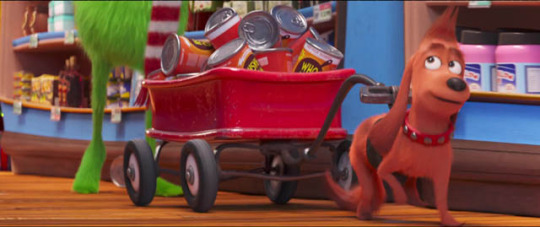
Eight cans of Who Hash!
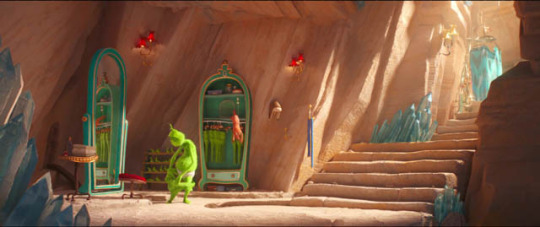
In and of itself, I feel this is a fine remake even if it cutesafies The Grinch a little bit. He complains in the original that he’s been putting up with Christmas for some 50 years and both he and Max look every bit of those 50 years but here he’s much more youthful here. It’s a very appealing design, very detailed with the fur but I am a bit confused as his attire. He’s seemingly naked but wears underpants to cover his shame, only to then wear furry trousers over that? He’s a very dirty, brownish green in the original but is much more vibrant here.

The original can seem like a bit of an acid trip at times with all the Suess babble and strange contraptions the Whos use and this pays homage to that during The Grinch’s Christmas heist as he pulls out all manner of interesting toys to help with his plot.
The Grinch himself doesn’t feel as one dimensional and there are times when he is quite hesitant to go through with what he’s doing or his eyes will widen with surprise upon hearing a point of view he never considered before, almost to a fault I’d say as it does dilute the big reversal in his character at the end.
Kind of like how that remake of The Lion King ruined ‘Be Prepared’, they turn “You’re a Mean One, Mr Grinch” into this sort of rap/hip-hop song which feels out of place. One positive musical number is this version of ‘God Rest Ye Merry Gentlemen’ by way of West Side Story as this group of carolers suddenly mass and chase after The Grinch with perfectly synchronised movement and finger snaps.
I want to look at something more specific here though. I’ve mentioned it before but a lot of these Christmas movies I look at tend to be more recent releases and for once this is one I actually saw in the cinema last year. It was inevitable that I would cover it having looked at the original and the Jim Carrey version but I proffered to hold off on talking about it because I like to use the stillframes to highlight something amusing or to emphasise a point. It could almost be a fresh watch though as I really didn’t remember much about it going into it again.
Outside of the Minion short that ran before it that is, which had two Minions breaking out of prison. I dread to think what those Minions did to end up there. I think that’s included as an extra on the DVD/Blu-ray which I don’t have here which is a shame as I remember kind of liking it, mostly down to its lack of speech. I do appreciate being able to portray story and humour without using any dialogue, goes back to that whole Mr Bean kinda thing. It made for a positive entry into that franchise for me as I think it’s something people are generally a bit sour of, probably down to how annoying they can be and the watch they’ve been latched onto, especially those weird memes you get from people’s mums on Facebook.
There is some element of that here as there is some humour to be had from the reactions of the non-speaking characters around The Grinch like Max or the reindeer he takes in as part of his scheme and renames Fred. It’s nice to have those subtle moments where just an awkward glance can be funny, in amongst all the exaggerated behaviour of the Grinch and the loudness of things like a random screaming goat. Actually, that goat is pretty funny as well.
The original you obviously have stuff like the KARLOFF narration, the wicked smile The Grinch has upon thinking of his plan and him slithering through the house while enacting it. The Jim Carrey one, my big takeaway was the look of it. I’m really surprised to learn that that particular version actually got an Academy Award for Best Makeup, as well as nominations for Best Art Direction and Costume Design. The original was pretty unique with its strange colours and imagery but I just remember the remake being deepy ugly with close up, wide angled lenses and those intensely creepy looking Whos.

If anything deserves nominations for visuals, it’s this version. Very striking, bright and colourful in and around Whoville when all its Christmas lights are lit.

But you also have these great shots at times that reflect the action on screen, be it the expansive action orientated shots of the down with Cindy Lou dashing through on her makeshift sled or the more moody look at The Grinch overlooking the town from up high on Mount Crumpit.

Or this vast cave structure in which he lives but only occupies but some tiny fraction of. Like here, he and his dog sit at this grand dinner table with a relatively posh light fitting overhead and a fancy multi headed candle holder decorating the table. It adds to this sense of preteniousness and superioty he has. But, at the same time, the two feel a million miles away from one another and they both seem like small figures in this enormous room. It’s almost a reminder of how he is a small part of this great big world.
Which is another thing I like here, how it touches upon how neurotic The Grinch is. It’s something the Jim Carrey version did too with his being bullied as a child but here he’s just entirely shunned from a very early age and is extremely isolated now.

At the very start you’re dealing with his agoraphobia and his reluctance to venture down to Whoville to resupply, as well a startling reflection on all the comfort eating he’s been doing that have left his cupboards bare in the first place.The look on his face here is truly haunting.

Just being in Whoville amongst all the Christmas lights and revelers pretty much sends him into a panic attack.

Even though he does feel so cut off from everyone, there is a sense that he fails to recognise his importance to other people, shutting out one of the Whos who tries to be friendly with him and not really appreciating Max. It’s a bit of a weird dynamic, with Max seemingly at The Grinch’s beck and call, fetching him his breakfast each morning but it does seem like he’d do anything for him and even gets a bit jealous when Fred comes into the picture. Hell, Fred even comes back at the end to save the day so obviously someone cares. And what a fine head of hair he has too.

But even when you think you’ve had a Hollywood ending where The Grinch has been redeemed, and learnt that Christmas perhaps means a little bit more, he still has to deal with his social anxieties. When he’s invited round for Christmas dinner, he hesistates on the doorstep, clutching his head in his hands as he tries to talk himself out of going by proclaiming that everyone will hate him.
On reflection, despite all the colours, lights and beautiful vistas, almost like Gremlins this movie really is stark reminder of the bleaker side of Christmas and the internal battle people sometimes face with their loneliness and depression. Really not something I was expecting to find in an innocent little kids film. People like to talk about how The Joker isn’t just another comic book movie but is actually a deep look at mental illness, maybe The Grinch beat it to it a year earlier by wrapping up this sombre look at the psyche in a neat Christmas bow?
2 notes
·
View notes
Text
The following is a drabble following Jameson’s role in Lyra’s life growing up. :-)
Lyra’s one, and it’s her birthday- or as close a date to it for one that she has, the night that Mr and Mrs. Coldwell brought home a snuffly little pink bundle. She’s lying in her crib, which is carefully void of any fabrics or flounces she might snag her hands on and suffocate herself with- Dr. Coldwell had been near neurotic in setting up the nursery, stripping and priming and re-painting the walls several times over, until they were ‘just right.’ It’s a room straight out of a maternity catalogue, and Jameson has to stoop down to avoid clonking his head on the slowly rotating mobile above her, as she sleepily blinks up at him.
“Hey,” he says, a little stupidly- unsure of how to interact with such a young child. He pokes one finger at her bib, moving the fabric down a little- it’s encrusted with spit and stuck to one chubby cheek. Lyra smiles at the sound of his voice- warm, low, and she reaches upwards, one tiny fist latching around his index finger. Her grip is surprisingly strong, and he stands there, hunched over the crib, staring down at the infinitesimally delicate life beneath him, a bare wisp of a flicker in the cold, long winter night.
»»————- ♡ ————-««
Lyra is two, and she laughs readily and easily. She’s an easy going baby, and Jameson has found himself a near staple feature in the Coldwell household, keeping an eye on the toddler through her mother’s long residency hours. She’d applied for a more lucrative speciality than she’d originally had in mind: paediatric cardiovascular surgery.
Lyra grins, tottering around as best as she can- holding onto the corners of low slung coffee tables and staggering around, nearly toppling over like a miniature drunk. Jameson snorts, watching her try to pull herself around the stacks of glossy magazines to toddle over to him. She’s got a bunch of colourful butterfly clips in her dark hair, which has just started to grow out of the tiny faux hawk she kept for most of her babyhood. Lyra manages to drag herself over to him, slapping her palms down on his knees to demand to be carried, and he obliges: holding her up so that she stands uneasily on his knee, giggling at the way he’s got her by the arms like a particularly naughty cat.
“Hello to you too, little miss,” he says dryly, and she giggles. She burbles, before suddenly lunging forward- and he has to readjust his grip to cradle her against his chest, narrowly avoiding dashing her front teeth against his shoulder. “Whoa,” he grunts, and she wriggles so that she can look him in the face, two tiny palms squished to his cheeks.
“Jam,” She says, and he’s so surprised by it that he nearly drops her. Lyra shrieks with laughter, eager to play this supposed new variant of the airplane game.
“Come again?” He asks, peering down at her suspiciously.
“Jam,” she repeats, smiling brightly up at him. Something in his chest aches. It’s sweet, up until she reaches up and grabs a fistful of his aviator glasses, cackling when she manages to rip them off of his head and wave them around just out of his reach.
»»————- ♡ ————-««
Lyra is three, and it’s the first time that Dr. Coldwell allows her to have icecream. “Just a taste,” her mother warns, voice tight and tired. She’s just come off of a fourteen hour shift, dark hair rumpled and twisted into a low chignon. Jameson notices the dark iodine staining her nail beds, but says nothing.
“Hey, Lyra,” he prompts, and Lyra turns to look at him, her hair in two chunky ponytails, held in place with hair ties with neon little plastic fruits on them. She beams at him, already reaching out. ‘Uncle Jameson,’ as she knows him, always has a gift for her when he comes to visit.
“Present?” She asks, and he nods, digging the tiny plastic spoon Dr. Coldwell hands him into his icecream cone. It’s vanilla soft serve, and he pops it into her mouth before she has a chance to ask him what it is. She’s surprised by the suddenness of his movement, but that surprise is soon chased off her face by delight. She’s smiling ear to ear, already leaning forwards to chase after him for more, and he laughs in spite of himself.
“Here, kiddo,” he says, and the endearment is still clumsy, but he hands her his whole cone. It’s worth the dirty look that her mother shoots him, (which he ignores, as he always does, he’s refrained from lighting up a cigarette underneath the brightly striped awning of the umbrella and that’s enough good behaviour for him for today as far as he’s concerned) to see the way that she grabs at it with two hands, and immediately sets about demolishing it like she’s never had anything that delicious before.
“You eat like a little alley cat,” he snorts, wiping off some icecream from her nose with his thumb, and Lyra sticks her tongue out at him. He pretends to ‘steal her nose’ and she shrieks with laughter, smacking him lightly on the arm with her fingers sticky with icecream.
»»————- ♡ ————-««
Lyra is twelve, and she’s a sullen preteen. “I’m going to be so old, Jameson. I’m going to be a teenager!” she bemoans, throwing her head against the back of her chair. She’s sitting up in the front seat, seatbelt firmly buckled into place. He’s driving with one hand, the other holding a cigarette as he blows a cloud of smoke- out of his open window. He turns slowly around the corner of the quiet neighbourhood, engine purring. She’s coming back from a day out with her godfather, since her parents had both been tangled up in the emergency room today.
He laughs, almost chokes on his own spit in doing so. He coughs, thudding a closed fist against his chest. Smoking’s going to catch up to him one of these days. “God, kid, you wish,” he jokes, before they pull up on her driveway, white quartz lining it crunching under the car’s tires. “Trust me, you ain’t seen nothing yet,” he says, and he ruffles her hair with one callused hand. Lyra rolls her eyes at him, arms crossed across her chest, and he just laughs lowly at her.
»»————- ♡ ���———-««
Lyra is sixteen, and she’s a vision in pink. It’s her sweet sixteen birthday party, and she grabs Jameson’s hand out of the blue, yanking him fiercely over to where the cake sits, prettily frosted with buttercream roses cascading down the side. “Uncle Jameson! We have to get a picture together,” she laughs, and he fixes the glittering tiara perched in her hair that’s come a little askew as it almost takes out his eye from her darting forwards.
She smushes her face up against his, leaning in close: as she snaps a selfie of the two of them with one of the various instant print polaroid cameras deposited around the party. He’s caught off guard, smiling reflexively. She holds up the picture for his inspection after the colours develop: he’s in his battered leather jacket, arm around her, crushing the lace flounces of her princess cut dress, Lyra grinning as if this is the happiest moment in her life. Her tiara is placed perfectly in her beachy curls.
»»————- ♡ ————-««
Lyra is eighteen, and Jameson has lined up several shot glasses. There’s several colours on display: and a blue jello shot wobbles in its container. “You’re going to learn what you like to drink today, kid,” he says, putting down a bottle of whiskey onto the crisp linen tablecloth. He’s careful not to let any drops of it soak into the pristine white surface, fussy about marring the tidy order.
“Sure, sure,” Lyra says, eyes sparkling with amusement. “You go first, Uncle Jameson,” she says, elbowing him lightly as he crowds her a bit, reaching over to pick up two of the tiny glasses. He hands her one, and she takes it, fingers brushing against his: they both have neon pink barbie manicures, with a holographic topcoat. She’d just finished painting his nails to match her own.
“Cheers,” he says, knocking it back: and Lyra mimics him. He chuckles when she pulls a face afterwards at the burn of it on the way down.
»»————- ♡ ————-««
Lyra is nineteen, and she’s sleeping with her head in his lap, dark hair fanning out beneath her like a halo. She’s got one hand folded up close to her mouth, breathing a little noisily as she softly snores, and he runs a hand over her hair, smoothing it down as if he’s petting a cat.
She’d fallen asleep on him after a movie night, popcorn bowl left half eaten on the low slung coffee table he watched her practicing walking with as a toddler. She’s grown into her face, no longer the chubby cheeked infant who would drool all over his dress shirts when he carried her around the house, more angular now, high fluting cheekbones just like her mother.
She still sleeps just like she did as a child though, entirely trusting, body relaxed and warm and pliant, dead weight heavy against him.
2 notes
·
View notes
Note
(1/2) I don’t think it’s fair to compare your feelings for the OG at this point in the story to your feelings for the remakes at the same point. Obviously with the OG, the only knowledge we had was what we had seen so far, and we had no idea what was to come. It was all so new to us, just like it was to the characters. It’s different with the remakes. I know each version is making things their own, but the general outline of the story is the same. And that outline is seared into our brains, so

Hi there, anon! I’ve seen a lot of concerns like this going around fandom and figured one would come my way at some point. It’s healthy to address though so I will do my best to. (I’ve divided things into categories so that I can try and express myself better.)
Skam in any form is great:
I felt this real kernel of sadness when I saw you say Skam og will ultimately lose when comparing remakes. Skam is an incredible show with its own incredible strengths, and you need never fear that that will be taken away by other people preferring this or that in other versions. It’s true that remakes have the advantage of building on Skam’s core material and changing things up with the benefit of hindsight or just different cultural contexts, but they are all so good in their own ways.
Skam had an amazing third season. Skam Italia had an amazing second season. Skam France is having an amazing third season.
I adore that each version of Skam comes with its own cinematography, mise-en-scène, music style, and above all: varied character personalities. Even though you know the basic premise (that core foundation of Skam’s Evak season), you’re still always kept on the edge of your seat because you never quite know how a character will behave when their personal contexts are all so different. Their inner demons manifest differently; their home life situations manifest differently; they have different ways of expressing themselves, of dealing with other people, of viewing the world depending on what type of school peers surround them; of viewing the country they live in, etc. All that is what makes watching different versions of the same base concept so interesting and enlightening each time.
Neither is better or worse, just different.
The mine field of Skam comparisons:
I need to quickly take this opportunity to discuss the mine field that is Skam comparisons – it feels like an inevitable part of this conversation.
Okay so: I think it is natural for human beings to compare things in order to make sense of their world. Every day we come across new concepts and stimuli, which we subconsciously group into pre-conceived categories in order to try and begin understanding them. There’s just too much to take in otherwise and we’d never be able to make sense of things. There’s a whole anthropological/psychological concept based on it called ‘Categorisation’ (but my uni days were long ago and lord knows where that text is in my room anymore).
So I do understand that some people feel uncomfortable with Skam comparisons, but sometimes they are a subconscious method of making sense of new stimuli. On this blog, I will make comparisons because that is how I process things. :)
Skam’s cuddling in bed scene:
Skam’s cuddling scene is iconic. The framing is something I will clutch to my chest until the day my heart stops beating. The first time I watched that scene, I loved it. I was moved. I was so riveted by the philosophical conversations they had with one another (I never wanted them to stop talking!). I liked seeing how they were together. I found their gentle kissing to be so sweet and affectionate.
I also started to worry a little because Even had a very sombre, ominous expression at one point when all was quiet and Isak couldn’t see. That expression was classic foreshadowing and I was wary of it. That sort of expression shouldn’t have been there in such a sweet scene; it was so jarring and out of place. Because of it, I knew it wouldn’t all be rainbows if Even was dealing with something that he wasn’t verbalising (be it the messy situation with Sonja or not).
In other words, Skam’s cuddling scene was a scene that achieved much more than just the heart-warming sweetness of a new couple infatuated by one another: it had layering which set multiple threads up and didn’t necessarily provide a complete emotional catharsis for its characters. It was brilliant writing that will always stand up on its own.
Rewatching Skam knowing all the twists = watching Skam France
As Evak’s story unfolded, we were eventually exposed to all of Even’s secrets and all the hard lessons Isak had to learn on his own journey. That meant that once the season was done, we were able to do something really cool: we could rewatch it armed with new knowledge.
Old scenes could be re-framed into something new, into something even more heavily nuanced: I rewatched Skam knowing that Even saw Isak on the first day of school (and how that changes things); I watched knowing Even has bipolar disorder; I watched knowing (Trigger Warning) that he has suicidal thoughts sometimes and once tried to act on them; I watched knowing how the misinformed and unhealthy views Isak had on mental illness was going to wreak havoc on his own life.
It meant I got to enjoy Skam armed with all the necessary information, just like I am watching Skam France now with that information as context (which isn’t necessarily accurate since we haven’t seen the entire season yet and are just using the base concept of Skam, but you get what I mean).
So yes, in that way, I can ’ fairly’ compare Skam’s cuddling scene with France’s cuddling scene. I know what Even was going through in that early stage of Evak’s relationship, just as I know that Eliott seems to be in a similar situation.
It will always come back down to this: Isak, Even, Lucas, and Eliott are different people, living in different countries, surrounded by different peers, with different cultural norms and behaviours. Evak have a very different relationship to Elu. That’s okay! One is not better than the other; they are just different and resonate differently to different people. (It’s also dependant on the way the showrunners choose to portray that storyline, which I will talk about in the next section).
What I was trying to express in my post about my initial reaction to Skam France’s cuddling scene was an acknowledgement that each couple is different and has brought out different reactions from me. Evak were in love but a little more cautious/reserved (which I’ve heard fits the Norwegian culture as well as their personalities); Nicotino were in love and very warm (which fits the Italian culture); Elu are in love and going full bloody throttle.
I, myself, am an Evak: I need that caution and reserve until I feel sure of things. I can’t handle the huge fireworks type of passion where you throw all of yourself into it and expose yourself that deeply, that quickly; that sort of intensity is an enemy of my anxiety disorder where I need control over everything. And that is why Elu’s cuddling scene brought out such a strong reaction in me: their emotional intensity is everything I fear in my own life.
Skam og and Skam France have a different style of storytelling that is no better or worse than each other:
When I said I felt fear when I watched Elu’s cuddling scene, it was with Elu as the context, not Evak. I find Elu’s sort of intensity dangerous for anyone to experience; that type of happiness cannot continue on that trajectory without some sort of force knocking it down – be it even just the smallest disappointment of an argument, for example. When you feel that intensely, the come down of it – by its very nature – is more intense. And knowing France’s M.O so far, that is exactly their point with filming the scene this way. They want us to jump off the love cliff with Elu so that the fall is as brutal as possible.
It wasn’t Skam’s style to turn the amplifier up to level 11 and I am glad for that. Their style was so laid back and raw and deceptive with its simplicity. It worked so well with the natural reservation of their culture (not being as touchy-feeling with peers, for example). There is a real power to subtlety and Skam perfected it.
Skam and France just use different storytelling methods is all. Naturally, the more overt in your face with emotions type of storytelling will bring out more intense first impressions. It doesn’t make France better or worse than Skam though.
We’re all different with our tastes; at different stages of our life, we might connect more with one storytelling method over another. Some days I crave overtly intense emotional rollercoasters like in Skam France because I get to vicariously feel things deeply in ways my anxiety disorder and its neurotically clenched reservation prevents me from feeling in my own life. But some days I want the art of subtly that Skam brings because I don’t have to exhaust myself in the same way while still feeling things deeply.
I love all Skams, guys. This show has my heart and soul!
This got long (as per usual)…
I hope I was able to express why I (and undoubtedly others) react the way I do with Skam France’s season, why I think it is fair for us to compare any of the versions, and how that shouldn’t diminish the value of other Skams. Thank you for stopping by to express your own feelings on it. :)
47 notes
·
View notes
Text
The Health unto Death – If such a thing as a psycho-analysis of today’s prototypical culture were possible; if the absolute predominance of the economy did not beggar all attempts at explaining conditions by the psychic life of their victims; and if the psychoanalysts had not long since sworn allegiance to those conditions – such an investigation would needs show the sickness proper to the time to consist precisely in normality. The libidinal achievements demanded of an individual behaving as healthy in body and mind, are such as can be performed only at the cost of the profoundest mutilation, of internalized castration in extroverts, beside which the old renunciation of identification with the father is the child’s play as which it was first rehearsed. The regular guy, the popular girl, have to repress not only their desires and insights, but even the symptoms that in bourgeois times resulted from repression. Just as the old injustice is not changed by a lavish display of light, air and hygiene, but is in fact concealed by the gleaming transparency of rationalized big business, the inner health of our time has been secured by blocking flight into illness without in the slightest altering its aetiology. The dark closets have been abolished as a troublesome waste of space, and incorporated in the bathroom. What psycho-analysis suspected, before it became itself a part of hygiene, has been confirmed. The brightest rooms are the secret domain of faeces. The verses: ‘Wretchedness remains. When all is said, / It cannot be uprooted, live or dead. / So it is made invisible instead’, are still more true of the psychic economy than of the sphere where abundance of goods may temporarily obscure constantly increasing material inequalities. No science has yet explored the inferno in which were forged the deformations that later emerge to daylight as cheerfulness, openness, sociability, successful adaptation to the inevitable, an equable, practical frame of mind. There is reason to suppose that these characteristics are laid down at even earlier phases of childhood development than are neuroses: if the latter result from a conflict in which instinct is defeated, the former condition, as normal as the damaged society it resembles, stems from what might be called a prehistoric surgical intervention, which incapacitates the opposing forces before they have come to grips with each other, so that the subsequent absence of conflicts reflects a predetermined outcome, the a priori triumph of collective authority, not a cure effected by knowledge. Unruffled calm, already a prerequisite for applicants receiving highly-paid posts, is an image of the stifled silence that the employers of the personnel manager only later impose politically. The only objective way of diagnosing the sickness of the healthy is by the incongruity between their rational existence and the possible course their lives might be given by reason. All the same, the traces of illness give them away: their skin seems covered by a rash printed in regular patterns, like a camouflage of the inorganic. The very people who burst with proofs of exuberant vitality could easily be taken for prepared corpses, from whom the news of their not-quite-successful decease has been withheld for reasons of population policy. Underlying the prevalent health is death. All the movements of health resemble the reflex-movements of beings whose hearts have stopped beating. Scarcely ever does an unhappily furrowed brow, bearing witness to terrible and long-forgotten exertions, or a moment of pathic stupidity disrupting smooth logic, or an awkward gesture, embarrassingly preserve a trace of vanished life. For socially ordained sacrifice is indeed so universal as to be manifest only in society as a whole, and not in the individual. Society has, as it were, assumed the sickness of all individuals, and in it, in the pent-up lunacy of Fascist acts and all their innumerable precursors and mediators, the subjective fate buried deep in the individual is integrated with its visible objective counterpart. And how comfortless is the thought that the sickness of the normal does not necessarily imply as its opposite the health of the sick, but that the latter usually only present, in a different way, the same disastrous pattern.
This side of the pleasure principle . – The repressive traits in Freud have nothing to do with the want of human warmth that businesslike revisionists point to in the strict theory of sexuality. Professional warmth, for the sake of profit, fabricates closeness and immediacy where people are worlds apart. It deceives its victim by affirming in his weakness the way of the world which made him so, and it wrongs him in the degree that it deviates from truth. If Freud was deficient in such human sympathy, he would in this at least be in the company of the critics of political economy, which is better than that of Tagore or Werfel. 1 The fatality was rather that, in the teeth of bourgeois ideology, he tracked down conscious actions materialistically to their unconscious instinctual basis, but at the same time concurred with the bourgeois contempt of instinct which is itself a product of precisely the rationalizations that he dismantled. He explicitly aligns himself, in the words of the Introductory Lectures , with ‘the general evaluation … which places social goals higher than the fundamentally selfish sexual ones’. As a specialist in psychology, he takes over the antithesis of social and egoistic, statically, without testing it. He no more discerns in it the work of repressive society than the trace of the disastrous mechanisms that he has himself described. Or rather, he vacillates, devoid of theory and swaying with prejudice, between negating the renunciation of instinct as repression contrary to reality, and applauding it as sublimation beneficial to culture. In this contradiction something of the Janus-character of culture exists objectively, and no amount of praise for healthy sensuality can wish it away. In Freud, however, it leads to a devaluation of the critical standard that decides the goal of analysis. Freud’s unenlightened enlightenment plays into the hands of bourgeois disillusion. As a late opponent of hypocrisy, he stands ambivalently between desire for the open emancipation of the oppressed, and apology for open oppression. Reason is for him a mere superstructure, not – as official philosophy maintains – on account of his psychologism, which has penetrated deeply enough into the historical moment of truth, but rather because he rejects the end, remote to meaning, impervious to reason, which alone could prove the means, reason, to be reasonable: pleasure. Once this has been disparagingly consigned to the repertoire of tricks for preserving the species, and so itself exposed as a cunning form of reason, without consideration of that moment in pleasure which transcends subservience to nature, ratio is degraded to rationalization. Truth is abandoned to relativity and people to power. He alone who could situate utopia in blind somatic pleasure, which, satisfying the ultimate intention, is intentionless, has a stable and valid idea of truth. In Freud’s work, however, the dual hostility towards mind and pleasure, whose common root psycho-analysis has given us the means for discovering, is unintentionally reproduced. The place in the Future of an Illusion where, with the worthless wisdom of a hard-boiled old gentleman, he quotes the commercial-traveller’s dictum about leaving heaven to the angels and the sparrows, 1 should be set beside the passage in the Lectures where he damns in pious horror the perverse practices of pleasure-loving society. Those who feel equal revulsion for pleasure and paradise are indeed best suited to serve as objects: the empty, mechanized quality observable in so many who have undergone successful analysis is to be entered to the account not only of their illness but also of their cure, which dislocates what it liberates. The therapeutically much-lauded transference, the breaking of which is not for nothing the crux of analytic treatment, the artificially contrived situation where the subject performs, voluntarily and calamitously, the annulment of the self which was once brought about involuntarily and beneficially by erotic self-abandonment, is already the pattern of the reflex-dominated, follow-my-leader behaviour which liquidates, together with all intellect, the analysts who have betrayed it.
Invitation to the dance . – Psycho-analysis prides itself on restoring the capacity for pleasure, which is impaired by neurotic illness. As if the mere concept of a capacity for pleasure did not suffice gravely to devalue such a thing, if it exists. As if a happiness gained through speculation on happiness were not the opposite, a further enroachment of institutionally planned behaviour-patterns on the ever-diminishing sphere of experience. What a state the dominant consciousness must have reached, when the resolute proclamation of compulsive extravagance and champagne jollity, formerly reserved to attachés in Hungarian operettas, is elevated in deadly earnest to a maxim of right living. Prescribed happiness looks exactly what it is; to have a part in it, the neurotic thus made happy must forfeit the last vestige of reason left to him by repression and regression, and to oblige the analyst, display indiscriminate enthusiasm for the trashy film, the expensive but bad meal in the French restaurant, the serious drink and the love-making taken like medicine as ‘sex’. Schiller’s dictum that ‘Life’s good, in spite of all’, papier-mâché from the start, has become idiocy now that it is blown into the same trumpet as omnipresent advertising, with psychoanalysis, despite its better possibilities, adding its fuel to the flames. As people have altogether too few inhibitions and not too many, without being a whit the healthier for it, a cathartic method with a standard other than successful adaptation and economic success would have to aim at bringing people to a consciousness of unhappiness both general and – inseparable from it – personal, and at depriving them of the illusory gratifications by which the abominable order keeps a second hold on life inside them, as if it did not already have them firmly enough in its power from outside. Only when sated with false pleasure, disgusted with the goods offered, dimly aware of the inadequacy of happiness even when it is that – to say nothing of cases where it is bought by abandoning allegedly morbid resistance to its positive surrogate – can men gain an idea of what experience might be. The admonitions to be happy, voiced in concert by the scientifically epicurean sanatorium-director and the highly-strung propaganda chiefs of the entertainment- industry, have about them the fury of the father berating his children for not rushing joyously downstairs when he comes home irritable from his office. It is part of the mechanism of domination to forbid recognition of the suffering it produces, and there is a straight line of development between the gospel of happiness and the construction of camps of extermination so far off in Poland that each of our own countrymen can convince himself that he cannot hear the screams of pain. That is the model of an unhampered capacity for happiness. He who calls it by its name will be told gloatingly by psycho-analysis that it is just his Oedipus complex.
Ego is Id . – A connection is commonly drawn between the development of psychology and the rise of the bourgeois individual, both in Antiquity and since the Renaissance. This ought not to obscure the contrary tendency also common to psychology and the bourgeois class, and which today has developed to the point of excluding all others: the suppression and dissolution of the very individual in whose service knowledge was related back to its subject. If all psychology since that of Protagoras has elevated man by conceiving him as the measure of all things, it has thereby also treated him from the first as an object, as material for analysis, and transferred to him, once he was included among them, the nullity of things. The denial of objective truth by recourse to the subject implies the negation of the latter: no measure remains for the measure of all things; lapsing into contingency, he becomes untruth. But this points back to the real life-process of society. The principle of human domination, in becoming absolute, has turned its point against man as the absolute object, and psychology has collaborated in sharpening that point. The self, its guiding idea and its a priori object, has always, under its scrutiny, been rendered at the same time non-existent. In appealing to the fact that in an exchange society the subject was not one, but in fact a social object, psychology provided society with weapons for ensuring that this was and remained the case. The dissection of man into his faculties is a projection of the division of labour onto its pretended subjects, inseparable from the interest in deploying and manipulating them to greater advantage. Psycho-technics is not merely a form of psychology’s decay, but is inherent in its principle. Hume, whose work bears witness in every sentence to his real humanism, yet who dismisses the self as a prejudice, expresses in this contradiction the nature of psychology as such. In this he even has truth on his side, for that which posits itself as ‘I’ is indeed mere prejudice, an ideological hypostasization of the abstract centres of domination, criticism of which demands the removal of the ideology of ‘personality’. But its removal also makes the residue all the easier to dominate. This is flagrantly apparent in psycho-analysis. It incorporates personality as a lie needed for living, as the supreme rationalization holding together the innumerable rationalizations by which the individual achieves his instinctual renunciation, and accommodates himself to the reality principle. But precisely in demonstrating this, it confirms man’s non-being. Alienating him from himself, denouncing his autonomy with his unity, psycho-analysis subjugates him totally to the mechanism of rationalization, of adaptation. The ego’s unflinching self-criticism gives way to the demand that the ego of the other capitulate. The psycho-analyst’s wisdom finally becomes what the Fascist unconscious of the horror magazines takes it for: a technique by which one particular racket among others binds suffering and helpless people irrevocably to itself, in order to command and exploit them. Suggestion and hypnosis, rejected by psycho-analysis as apocryphal, the charlatan magician masquerading before a fairground booth, reappear within its grandiose system as the silent film does in the Hollywood epic. What was formerly help through greater knowledge has become the humiliation of others by dogmatic privilege. All that remains of the criticism of bourgeois consciousness is the shrug with which doctors have always signalled their secret complicity with death. – In psychology, in the bottomless fraud of mere inwardness, which is not by accident concerned with the ‘properties’ of men, is reflected what bourgeois society has practised for all time with outward property. The latter, as a result of social exchange, has been increased, but with a proviso dimly present to every bourgeois. The individual has been, as it were, merely invested with property by the class, and those in control are ready to take it back as soon as universalization of property seems likely to endanger its principle, which is precisely that of withholding. Psychology repeats in the case of properties what was done to property. It expropriates the individual by allocating him its happiness.
Always speak of it, never think of it . – Now that depth-psychology, with the help of films, soap operas and Horney, has delved into the deepest recesses, people’s last possibility of experiencing themselves has been cut off by organized culture. Ready-made enlightenment turns not only spontaneous reflection but also analytical insights – whose power equals the energy and suffering that it cost to gain them – into mass-produced articles, and the painful secrets of the individual history, which the orthodox method is already inclined to reduce to formulae, into commonplace conventions. Dispelling rationalizations becomes itself rationalization. Instead of working to gain self-awareness, the initiates become adept at subsuming all instinctual conflicts under such concepts as inferiority complex, mother-fixation, extroversion and introversion, to which they are in reality inaccessible. Terror before the abyss of the self is removed by the consciousness of being concerned with nothing so very different from arthritis or sinus trouble. Thus conflicts lose their menace. They are accepted, but by no means cured, being merely fitted as an unavoidable component into the surface of standardized life. At the same time they are absorbed, as a general evil, by the mechanism directly identifying the individual with social authority, which has long since encompassed all supposedly normal modes of behaviour. Catharsis, unsure of success in any case, is supplanted by pleasure at being, in one’s own weakness, a specimen of the majority; and rather than gaining, like inmates of a sanatorium in former days, the prestige of an interesting pathological case, one proves on the strength of one’s very defects that one belongs, thereby transferring to oneself the power and vastness of the collective. Narcissism, deprived of its libidinal object by the decay of the self, is replaced by the masochistic satisfaction of no longer being a self, and the rising generation guards few of its goods so jealously as its selflessness, its communal and lasting possession. The realm of reification and standardization is thus extended to include its ultimate contradiction, the ostensibly abnormal and chaotic. The incommensurable is. made, precisely as such, commensurable, and the individual is now scarcely capable of any impulse that he could not classify as an example of this or that publicly recognized constellation. However, this outwardly assumed identification, accomplished, as it were, beyond one’s own dynamic, finally abolishes not only genuine consciousness of the impulse but the impulse itself. The latter becomes the reflex of stereotyped atoms to stereotyped stimuli, switched on or off at will. Moreover, psycho-analysis itself is castrated by its conventionalization: sexual motives, partly disavowed and partly approved, are made totally harmless but also totally insignificant. With the fear they instil vanishes the joy they might procure. Thus psycho-analysis falls victim to the very replacement of the appropriate super-ego by a stubbornly adopted, unrelated, external one, that it taught us itself to understand. The last grandly-conceived theorem of bourgeois self-criticism has become a means of making bourgeois self-alienation, in its final phase, absolute, and of rendering ineffectual the lingering awareness of the ancient wound, in which lies hope of a better future.
...Freedom of thought . – The displacement of philosophy by science has led, as we know, to a separation of the two elements whose unity, according to Hegel, constitutes the life of philosophy: reflection and speculation. The land of truth is handed over in disillusion to reflection, and speculation is tolerated ungraciously within it merely for the purpose of formulating hypotheses, which must be conceived outside working hours and yield results as quickly as possible. To believe, however, that the speculative realm has been preserved unscathed in its extra-scientific form, left in peace by the bustle of universal statistics, would be to err grievously. First, severance from reflection costs speculation itself dear enough. It is either degraded to a docile echo of traditional philosophical schemes, or, in its aloofness from blinded facts, perverted to the non-committal chatter of a private Weltanschauung . Not satisfied with this, however, science assimilates speculation to its own operations. Among the public functions of psycho-analysis, this is not the least. Its medium is free association. The way into the patient’s unconscious is laid open by persuading him to forgo the responsibility of reflection, and the formation of analytic theory follows the same track, whether it allows its findings to be traced by the progress and the falterings of these associations, or whether the analysts – and I mean precisely the most gifted of them, like Groddeck 2 – trust to their own associations. We are presented on the couch with a relaxed performance of what was once enacted, with the utmost exertion of thought, by Schelling and Hegel on the lecturer’s podium: the deciphering of the phenomenon. But this drop in tension affects the quality of the thought: the difference is hardly less than that between the philosophy of revelation 1 and the random gossip of a mother-in-law. The same movement of mind which was once to elevate its ‘material’ to a concept, is itself reduced to mere material for conceptual ordering. The ideas one has are just good enough to allow experts to decide whether their originator is a compulsive character, an oral type, or a hysteric. Thanks to the diminished responsibility that lies in its severance from reflection, from rational control, speculation is itself handed over as an object to science, whose subjectivity is extinguished with it. Thought, in allowing itself to be reminded of its unconscious origins by the administrative structure of analysis, forgets to be thought. From true judgement it becomes neutral stuff. Instead of mastering itself by performing the task of conceptualization, it entrusts itself impotently to processing by the doctor, who in any case knows everything beforehand. Thus speculation is definitively crushed, becoming itself a fact to be included in one of the departments of classification as proof that nothing changes.
Theodor Adorno, Minima Moralia
2 notes
·
View notes
Note
"Can you die of happiness?"
pride and prejudice starters. / accepting!

an absolutely solid question, vital even, in the grand scheme of things. it is something they always return to in their conversations: how can they be happy, are they happy, and more than happy enough? he wishes to believe they are, the way they finally gave themselves a chance after the first and disastrous trial of a relationship ( not even a real one, an affair ⸺ two separate and married people finding themselves in the middle of grade a disaster idea neither of them could walk away from, although both of them knew they needed to ). in the end she has been stronger than him, better than him at this, and decided for both of them. and it has been the right thing to do back then, to fix the shambles of his life without dragging her into it and to give her the space she deserved and fought so hard for to have and to grow in. he let her go, not easily, but of course he did ⸺ he could never say no to her, could he? one pie enough to render him into a nearly senseless man, a fool for her through and through, and happier than he has been in a long time. and it has been hard to leave this behind, the safety of their arrangement and the peace he found in her presence, but it was for the better. his wife deserved the truth, some honesty from him about the shift in his behaviour that has needed an explanation for a while now, and a better husband, a better man, anyway. someone who could love her like he did in the beginning, someone who could love her like he loved somebody else. she gave him hell for it, rightfully so and he knew it, but it has been hard. everything about this period in his life has been hard, safe for the time he spent with the expert pie maker, and the aftermath has been the worst of it. missing her, losing the stability he had in his life, only finding joy in his work the way he usually did, but entirely farthest away from happiness in all other regards of his life. it was like every door he made for himself shut into his face simultaneously, never for him to walk out of the rut he created for himself.
only with returning to the small town he left behind in search for happiness, in a pursuit for it ( the pie he missed always coming to mind when hearing the phrase ), he found what he has been looking for. it has always been jenna; the light that resided in her eyes so sparsely the first time he met her and now resided there like it found a nice home for itself, how just her presence in a room drew his eyes away from any other matter he had to attend, transfixed and enraptured and special in only the way she was, and then of course her kindness and her talent and her love for her family ⸺ lulu, the diner with its patrons, her two best friends. it was happiness on a silver plate, she was, always has been to him, and it has not taken much for him to fall back into the love he never stopped feeling for her. she made all his fears reduce to ash, made his hands stop fidgeting and the knot in his chest ease, and she made him feel better about himself just for the simple fact that she has loved someone like him in the first place, someone so unstable, so fizzy, someone so afraid of everything and yet never afraid of what they had. he used to be a burned-out and erratic picture of a man, neurotic and unhappy and unruly, and it is as if she made sense of all the parts of himself that never fit without her around. she helped him piece himself back together. she inspired him and still does to this day, more than anybody else, so how could he not ask her again? ask her if she’d try again, if she still loved him too, or if she wanted to love him again? anything, really, just anything. ( although he did prepare himself for rejection, to leave again once she’d say no to him, to search for his life someplace else and be glad to know she was happy. ) but then she said yes, and suddenly everything locked into place. euphoric and ecstatic and swooping her up in a kiss and her kissing him back and a house full of love and laughter and life and becoming a steady heartbeat again instead of the jagged and irrational thing beating away in his chest.
“i hope not,” he tells her finally, looking down at her after he kissed her, something he now is free to do whenever he wants to; and what a thrill this simple fact alone is to him. they move around each other in perfect synchronization, two parallel lines never meeting but running the same course together, and colliding when they deliberately want to. arms around her waist and hands on the small of her back, keeping her close to him the way he loves to do, to know her in his arms and her smile against his lips, to look down at her and see nothing but the one person he loves most in the world, the one person that could always bring him down to earth when in danger of tethering away. and of course, the little girl looking so much like her mother that also captured his heart in a matter of minutes when he returned and now has her own place there ⸺ both of them give him so much and he could only every try to pay them back in kind every day. to love them with everything he has. smile wide on his face, feeling like it could split it in two, his nose touching hers as he leans down to kiss her again ( he would never ever tire of it! ) and stand so close to her that there legs are a little tangled up, chests nearly aligned, and yet never close enough. “if that would be the case, i’m pretty sure this here would be heaven. pinch me to show me this is real.”
#i might be crying a little ...#he loves her SO SO much#withflour#[ yeah; no; that’s exactly what I mean! ] ⸺ ( answered. )
1 note
·
View note